Rockbridge Academy Blog
The Case for Logic
.jpg)
One of the questions folks sometimes ask regarding the placement of logic as part of the classical science curriculum is why? Why do we take an “entire year away” from the science curriculum during 8th grade to teach logic instead of furthering the students' scientific knowledge? Well, if one considers that a typical definition of science has to do with testing hypotheses regarding our observations of the natural world, then one must ask “by what means do we test these hypotheses?” What tools must a student possess in order for them to do science well? Having made observations about the natural world, how then are they supposed to analyze and understand these observations?
The answer to this question is logic. A student's understanding of and ability to wield the tool of logic is integral to any science curriculum as it provides the means by which any scientific inquiry or conclusion can be tested and proven. Without logic, the actual process whereby scientific hypotheses are formulated and analyzed would be impossible. Logic is the fundamental tool used by scientists to actually do science. Since that is the case, does it make sense (appeal to logic here) to send them off to do science with a test tube, petri dish, and Bunsen burner but not logic?
Logic is the fundamental tool used by scientists to actually do science. Since that is the case, does it make sense (appeal to logic here) to send them off to do science with a test tube, petri dish, and Bunsen burner but not logic?
Now some might say, “but logic is a natural, innate ability developed over time like speaking, reading, or writing.” Although this is true at some level, we do not leave students to fend for themselves, hoping they develop these attributes. We assiduously teach them to speak well and to write well and to read well. This should be no less true with regard to thinking. Students need to be taught, not only to think, but especially how to think and reason well. It seems self-evident that much of the modern western world has given up on the ancient classical commitment to learning logic and the result has been a demonstrable level of irrationality even among our “college elites.”
With that said, it’s important to note that a classical education does not think of the different subject areas as independent and unrelated. Science, math, literature, history, they are all part of an integrated whole with theology as the queen over them all. As a result, each particular subject helps to inform and illuminate the others. Logic especially undergirds all the other subjects as the foundation upon which access to these other subjects rests. The science of logic is to understand and implement the structures by which we think and reason and then to apply that ability to every other area of our students' studies.
Since logic is the scientific study of how we think and reason, the logic curriculum is a year-long study of the form that thinking and reasoning takes, namely arguments. By argument, I mean the development of a conclusion based on a series of premises. Practically everything we read, experience, or engage in, though most of the time it’s subconscious, can be formulated as an argument beginning with premises that lead to a conclusion. When you pull up to a stoplight you engage in an argument. You have a premise, “If the light is red it means I should stop.” Then you have another premise: “the light is most certainly red.” Therefore, you come to the conclusion, “I will stop.” In every commercial you watch, every article you read, paragraph you write, billboard you pass, action you decide to take, science experiment you run, history lesson you hear, mathematical problem you solve, theology discussion you have, soccer kick you make, and so on infinitum you are engaging in evaluating arguments. This is why we dedicate a full year to helping students understand the form and nature of argument.
The students learn how to identify and interact with arguments. They learn to be discerning about the arguments being made all around them by learning how to examine newspapers, magazines, commercials, social media posts, comics, political cartoons and debates, TV ads, movies, songs, etc. in order to evaluate and discern whether the arguments are sound or fallacious.
The ultimate goal of the logic class is not only to prepare the students to be able to excel at scientific inquiry or to be able to write good paragraphs or become better equipped to analyze literature, but more importantly, to be able to withstand the lies of the evil one and to take every thought captive to the obedience of Christ.
The ultimate goal of the logic class is not only to prepare the students to be able to excel at scientific inquiry or to be able to write good paragraphs or become better equipped to analyze literature, but more importantly, to be able to withstand the lies of the evil one and to take every thought captive to the obedience of Christ. All our efforts at educating our children would be in vain if we did not properly prepare them to fight against the powers and principalities of the air who stand ready to capture them with deceptive philosophies and dangerous ideologies. They need to be adequately prepared to be warriors against the deceits and lies of this present darkness. I begin the school year telling my students that, essentially, logic is a course in “the defense against the dark arts.” There is certainly a war being waged for the hearts and minds of our children. It is our responsibility to train them that they might not be taken “captive by philosophy and empty deceit, according to human tradition, according to the elemental spirits of the world, and not according to Christ” (Col 2:8). By God’s grace, our students are prepared, through all of their coursework here at Rockbridge, to stand firm against all the wily schemes of the evil one that they might “be able to withstand in the evil day, and having done all, to stand firm” (Eph 6:13).
Daron Lawing has served at Rockbridge Academy since 2010 teaching History, Bible, Logic, Debate, and most recently Computer Programming. He earned an MDiv from Reformed Theological Seminary in 1995 and served in church ministry for 3 years and 13 years as a software developer prior to coming to Rockbridge. He loves scintillating discussions, the feel of a chisel paring away slivers of wood, and the smell of frying bacon. Daron and his wife, Jennifer have three grown children, all graduates of Rockbridge Academy.
Ancient History and the Modern Student
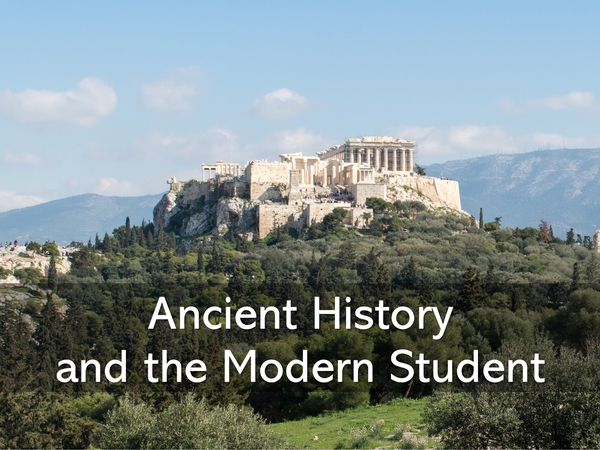
To be ignorant of what occurred before you were born is to remain forever a child.
~Marcus Tullius Cicero
Roman statesman, philosopher, and orator, Marcus Tullius Cicero, said, “To be ignorant of what occurred before you were born is to remain forever a child.” If we do not know who and what came before us, we cannot learn from the mistakes and successes of others, and will, therefore, remain foolish in our thinking and actions. One of the primary goals of a good education is to produce morally responsible men and women who understand and value their civic duties for society to function well. Additionally, education should form the affections to love the Biblical standards of truth, goodness, and beauty so that the student desires to imitate God. Studying ancient history within the classical framework viewed through the lens of Scripture is a valuable pursuit for the modern student.
Building upon what the student already learned in the grammar stage, the Rockbridge seventh grader learns ancient history—from Creation to the fall of the Roman Republic. By studying the past, the student begins to have a greater understanding of how our present age and worldviews were shaped, how lessons of the ancients are relevant today, and how studying history leads to a deeper knowledge of oneself and of God’s sovereign plan.
By studying the past, the student begins to have a greater understanding of how our present age and worldviews were shaped, how lessons of the ancients are relevant today, and how studying history leads to a deeper knowledge of oneself and of God’s sovereign plan.
For the modern student who wonders about why the world is the way it is today, the classical teaching methodology of ancient history will answer his question. By 7th grade, the student has already formed certain presuppositions that determine how he makes decisions and interacts with reality. By studying the past, the student gains a greater understanding of how our present age was shaped. Ideas of the past have consequences. For example, the Athenians argued against the Melian idea of freedom and justice, that “the strong do what they will and the weak suffer what they must” as they attempted to expand their empire. This idea, “survival of the fittest,” had tremendous consequences throughout history which points to how our present age was shaped. The student considers this idea by reading the Melian Dialogue, identifying and analyzing arguments on both sides, and contrasts it to Scripture which teaches us to care for the weak and oppressed and offers a different idea of freedom and justice. If the student understands the problems of the past and their attempted resolutions, it helps him understand today and where we may be headed in the future.
As the modern student of ancient history learns how our present age was shaped, he also wonders about what lessons he can learn from long-deceased men of ancient times. After all, haven’t we “advanced” as a society and as human beings since then? Through the classical methodology, time-tested vices, virtues, beliefs, and practices are taught. Civic and moral codes of the ancients reveal how decisions and actions have consequences and can be used today as either “base things to avoid or fine things to imitate” (Livy). The student learns to be civically and morally literate by judging past actions and applying those lessons today.
Our founding fathers continually turned to the ancients for lessons in vice and virtue. For example, the founders studied the lives of men like Julius Caesar, who sought to advance his own power, and Cincinnatus, who willingly gave up his power. To the founders, one was a villain, the other a hero. These vices and virtues are the same today as they were then. They are time-tested. Have we “advanced”? Our sinful human nature says, “No.” This is what we have in common with all mankind throughout history. The modern student realizes this as he studies the ancients and learns of vices to be aware of and virtues of men and women upon whose shoulders we can stand.
Finally, the modern student of ancient history wonders how he can come to a deeper knowledge of himself and God’s sovereign plan of salvation for fallen human beings. First, classical Christian education considers the framework of the student and how he was designed by our Maker. In the dialectic stage, the student begins to distinguish between good and evil and make judgments. In making these moral distinctions, he gains a finer understanding of himself and the world. Age-appropriate examples of good and evil throughout history are taught and confront the student with his sinful nature, the need for repentance, and the need for a Savior. The modern student who examines his life honestly will see himself in others who have gone before him and create a desire in him to love God’s standards of what is true, good, and beautiful and make the right choices.
Furthermore, history finds its existence and relevance exclusively in God and His will for His creation. History cannot be known apart from the knowledge of God and His relation to the universe. History begins at Creation. After the Fall, in times of darkness, before Christ, the modern student learns how God is setting the stage to reveal “a light for revelation.” The light for which man has been searching. Christ, the light, who comes during turmoil and uncertainty, transforms the world. For history to make sense and why it matters to the modern student today, it is imperative that he or she understands the magnitude of this transformation, its effect upon humanity, and that every single event is the manifestation of God’s providential plan. All of history before Christ points to the cross and therefore, should be studied.
For history to make sense and why it matters to the modern student today, it is imperative that he or she understands the magnitude of this transformation, its effect upon humanity, and that every single event is the manifestation of God’s providential plan. All of history before Christ points to the cross and therefore, should be studied.
Through studying ancient history, the modern student learns about western heritage and man’s quest for justice and freedom—out of which comes true justice and freedom in Christ. Ultimately, by studying ancient history, it is the hope that it will lead the modern student to deeper and richer worship of Christ and equip him to be a light to the lost. People and events of ancient history are just as relevant as the issues we face today—both have something in common—sinful human nature. The Apostle Paul writes about examples of men who were written down as warnings for us, men who were idolaters, and perished for it. Let us not be as children who do not heed the lessons of the past, rather let us learn from those who have gone before us to teach us what we ought to do.
Jean Grev has taught dialectic Ancient and European History at Rockbridge Academy since 2012. She graduated with a BA in communications arts and sciences with an emphasis on public speaking and rhetoric and a minor in business management from Michigan State University. She resides in Annapolis, Maryland with her husband; her three children are in the Rockbridge Academy classes of 2020, 2021, and 2025.
Faith in Action: Summer Missions with Mr. Swanson
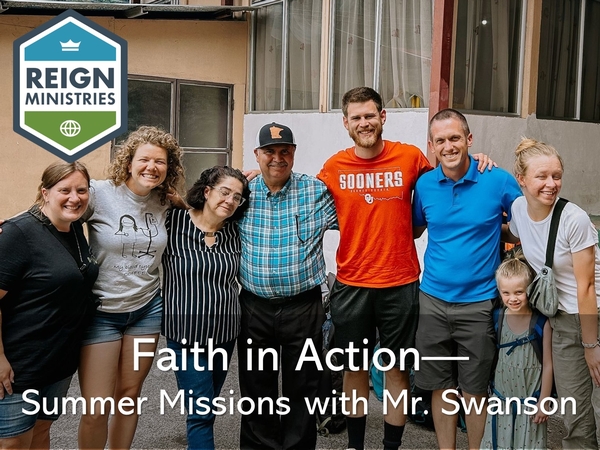
My passion and calling in life is to make disciples of Jesus, and part of how God has led me to do that is through leading mission trips with Royal Servants Mission Trips during my summers away from teaching Bible at Rockbridge Academy. Royal Servants is a division of Reign Ministries, an organization that exists to build and advance the kingdom of God by developing youth and youth leaders who have great commandment hearts and live great commission lifestyles.
My first summer with Royal Servants was as a 17-year-old student. I loved the community of a Royal Servants team. It was a powerful experience to be a part of a team of my peers who were all focused on a unified mission for Christ as they worshiped and sought the LORD together in the Scriptures. Sharing the gospel was a really stretching experience for me, especially cross culturally. I loved every minute. I returned for a second and third year as a student and received leadership training and the opportunity to study the Bible in Israel. After I started teaching in 2008, it was a no-brainer to return to serve with Royal Servants during the summers and help provide that same discipleship experience for the next generation of students.
We believe that this sort of training and mission experience can be an integral part of growing young people into what David Kinnaman calls “resilient Christians” who are able to sustain and live out their Christian faith in a post-Christian culture.
A Royal Servants Trip is different from many other mission trips. They are between 5 and 8 weeks long and start with intensive training at our camp prior to going overseas. As a part of the trip, there is an intensive discipleship training program that each middle school, high school, and college student goes through. We study and memorize the Scriptures together, talk about the Word in small groups, worship, and learn how to effectively share the Gospel in a cross-cultural setting. Our trips are not meant to be an end in and of themselves but are field experience and a part of the training to go, live out, and share the Gospel at home. It is a summer of service for a lifetime of ministry.
We send teams all over the world each summer. Last summer (2023), my wife Stacey and I, along with our three children, led a trip to Costa Rica where Royal Servants has been partnering with a church for 20 years. Our ministry is focused on connecting our students with other teenagers and giving them the opportunity to share the Gospel. Most days we traveled to a nearby town and set up at the local soccer field. We would play pickup games of soccer along with other games and activities. We also used dance, drama, and puppets (for little kids) to build a crowd and share the Gospel. Members of the youth group from our church partner joined us as interpreters since most of our students did not speak much Spanish. On our last day of ministry, we had been invited to the local elementary school to serve in the classrooms during the morning. During recess, we played and shared the Gospel. After lunch, Pastor Alfonso, the Costa Rican pastor with whom we partner, had the chance to do a special assembly with 5th and 6th grade students. During that time, 15 students prayed to put their faith in Christ. It was an awesome way to end our ministry in Costa Rica.
We continue to find that spending five weeks away from the routines and distractions at home and moving into an intentional community focused on seeking and serving Jesus continues to be a profound and life changing experience for many students.
We continue to find that spending five weeks away from the routines and distractions at home and moving into an intentional community focused on seeking and serving Jesus continues to be a profound and life-changing experience for many students. We believe that this sort of training and mission experience can be an integral part of growing young people into what David Kinnaman calls “resilient Christians” who are able to sustain and live out their Christian faith in a post-Christian culture. We had one Rockbridge student join us last summer. We plan to continue to serve in Costa Rica this summer (2024) and, LORD willing, for years to come. We would love to have more Rockbridge students join us in serving Christ around the world this summer. Would you or your student be willing to join us in a life-changing summer of seeking Jesus together?
Please contact me at mswanson@rockbridge.org for more information.
CLICK HERE to read the final update from our summer 2023 trip.
Matt Swanson, a graduate of Gordon-Conwell Theological Seminary, has served as an upper school Bible teacher for 16 years and has been leading Royal Servants Missions Trips for 14 years. He joined Rockbridge Academy in 2022. Matt and his wife, Stacey, have three children.
To Love and Understand: The Classical Vision in Controversial Times
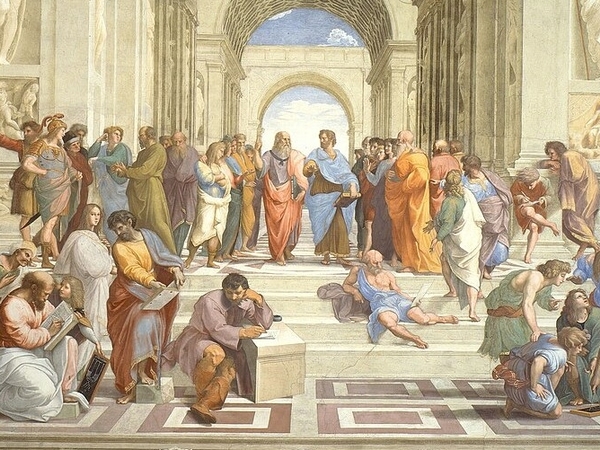
A decade ago, I was in my senior year at Rockbridge Academy. A lot has happened in that time, but through it the things I learned here have been a significant and treasured influence in my life. While I would be remiss not to remark on the dear mentors and close friends I made here, I want to focus this brief reflection on the vision of the world I learned from Rockbridge, with an eye to how it eventually landed me where I am now, in the theological academy.
When Nietzsche wrote that “Whoever really wishes to become acquainted with something new (whether it be a person, an event, or a book), does well to take up the matter with all possible love,” he was only repeating something that classical educators had known for millennia—that the process of learning is first a moral, and then an intellectual endeavor, or rather, that any distinction between moral and intellectual endeavors is as specious as the anthropology it undergirds is facile.
This paradigm is deeply entrenched in the Christian intellectual tradition. The Greek Fathers understood the intellect as a desiring faculty that intrinsically (if often unconsciously) sought after God and was fulfilled only in prayer; in the Latin west, Augustine’s trinitarian theology (tragically neglected by American Christians in recent years) emphasized that the very structure of the human mind pulls it towards its one end: the worship and enjoyment of God.
This is the anthropology at stake in the classical understanding of education as moral formation and within which tools like the Trivium can flourish. Its profundity is that it reflects an entire vision of the world as the theater of God’s glory. Education is formation because curiosity is a form of generosity, of hospitality towards the new and the strange; but this is merely the anthropological reflection of the objective fact that all created truth and goodness beckon us onward to the eternal wellspring that is Truth and Goodness: God—Who is Himself Love. The only light that illumines truth is the generous light of God’s creating goodness sealed in the steadfast love of redemption. And as in the archetype, so in the ectype: for Christians, to know must always mean to love.
This is the anthropology at stake in the classical understanding of education as moral formation and within which tools like the Trivium can flourish. Its profundity is that it reflects an entire vision of the world as the theater of God’s glory.
In other words, classical and Christian are not separable modifiers of education, but a cohesive way into studying the basic and unifying God-ward-ness of the world. We study the classical texts as Christians, not out of abstract adherence to a canon, but because in that canon we can inherit the practiced eye of centuries of Christians who have repeatedly and delightedly found that God’s truth, goodness, and beauty precede them there. These texts provide a fertile training ground for the virtues of wisdom, patience, and generosity required for learned cultural engagement today, indeed, for any faithful Christian walk—which is only the repeated referring all our lives to the giving and grace of God.
In other words, classical and Christian are not separable modifiers of education, but a cohesive way into studying the basic and unifying God-ward-ness of the world. We study the classical texts as Christians, not out of abstract adherence to a canon, but because in that canon we can inherit the practiced eye of centuries of Christians who have repeatedly and delightedly found that God’s truth, goodness, and beauty precede them there.
Indeed, it is those who thought that Christ and culture were most sharply opposed who likewise opposed the reliance on Greek models inherent to classical education. Conversely, Paul models the classical vision in Acts 17, in seeing that God got to Greece before him, and his job is to name the unknown God, in whom the Athenians already knew that they lived, and moved, and had their being. Similarly, the first Christian apologist, Justin Martyr, argued that Plato had dimly pointed to Christ, that Jesus was the proper fulfillment of the way of the Stoics—that it was the Christians who followed true philosophy. Christians have always most profoundly challenged the cultures around them by finding seeds of the Word and by naming Jesus Christ as the true fulfillment of those seeds.
On a personal note, these themes have been the common thread (perhaps the only one!) in my own continuing education. Studying theoretical physics at MIT, I found that a guiding intuition of much of this research was that the elegance of a theory is not just an arbitrary aesthetic value but also an indicator of the depth of penetration into the mysteries of the universe. Truth, goodness, and beauty coalesce at precisely the point where being itself becomes most transparent to the properties of its Creator.
Similarly, my study of theology at Yale, integrating as it does philosophy and cultural studies, would make little sense if one did not believe that all the activity of man’s mind is animated by the restless heart searching for rest in God, and that that search must leave its mark on all knowledge. Indeed, this most recent trajectory felt like the response to the turmoil of 2020 that would be most faithful to the vision Rockbridge has given me: to leave my stable job in finance for the life of the mind pursued in service to Christ; with the faith that commitments to justice, to generosity of interpretation, and to truth are always finally commitments to God Himself; and in confidence, alongside Paul and Justin, that the sharpest apparent conflict of worldviews opens upward in the possibility of the most incisive work of the gospel.
Similarly, my study of theology at Yale, integrating as it does philosophy and cultural studies, would make little sense if one did not believe that all the activity of man’s mind is animated by the restless heart-searching for rest in God, and that that search must leave its mark on all knowledge.
This is not to say that classical Christian education is fundamentally optimistic about human culture. Quite the opposite: if God is the proper end of all intellectual activity, then the subjects of education can be corrupted by human rebellion far more pervasively than if these studies were something morally neutral. But the conditions of this corruption are also the possibility of restoration. Evil is always parasitic, and thus only parasitic—masking an ever-prior God-ward-ness. The constructive, God-centered vision of Christian education means that “the culture” as such can never be the enemy.
The great method or technique of this ongoing discernment can only be the imitation of God’s love. If the goodness of the world stems from the generosity of God, then it is to evoke our generosity as well. Nietzsche continues: One “does well to take up the matter with all possible love, and to avert his eye quickly from all that seems hostile, objectionable, and false therein—in fact to forget such things; so that, for instance, he gives the author of a book the best start possible, and straightway, just as in a race, longs with beating heart that he may reach the goal.” If the God who is Truth is also Love, then formation in His image is the only possible pedagogy.
Taylor Craig, Rockbridge Class of 2014, is in his 3rd year of a master’s degree in Theology at Yale Divinity School, where he also works as a research assistant to Prof. Miroslav Volf. He is especially interested in trinitarian theology, early Christian interaction with Greek thought, and postmodern theologies of culture and language.
On Veterans Day
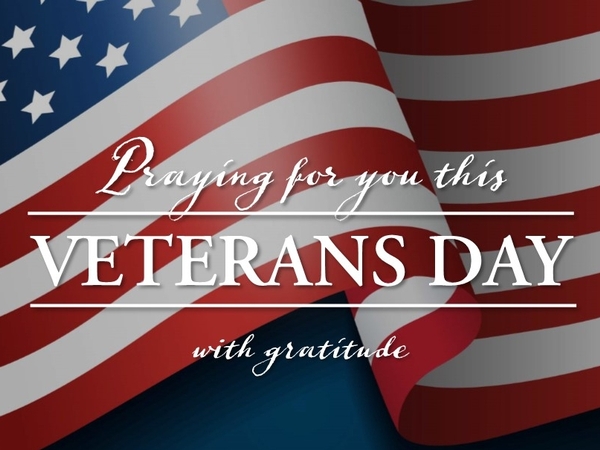
Sixty years ago, President John F. Kennedy, while honoring a different occasion, spoke something that is relevant here:
“A nation reveals itself not only by the men it produces, but also by the men it honors, the men it remembers.”
The tradition of setting aside a particular day to honor American veterans extends back to the end of the First World War, which concluded at the 11th hour of the 11th day of the 11th month of 1918. Dubbed “Armistice Day,” it was an occasion to honor the veterans of that great conflict. But because the War to End All Wars didn’t, in 1954 Congress amended the commemoration by changing “armistice” to “veterans” in order to honor all military personnel who have worn the uniform of the nation, whether in war or peace.
However, Veterans Day is just one of three holidays honoring our military. Correctly distinguishing between them is important, if sometimes confusing. Definitions help. Per US Code, a “veteran” is one who served in the US military and was subsequently released on conditions other than dishonorable. The past tense is important. Armed Forces Day, probably the least well known of our martial holidays, honors those who are currently serving. Memorial Day, as the name ought to imply, is for remembering those Americans who gave their lives while serving the nation. Though Veterans Day carries a dimension of this memorial component in that it officially honors all veterans, whether living or dead, in practice the day is largely devoted to thanking living veterans for their service.
So, on this day, Americans of all faiths or none take a moment to remember that we—the many—live under debt—to the few. Christians should be the first to do so. While the “few” we honor today are not specifically the fallen, everyone who has put on the cloth of the nation knows that in the performance of their duty they may be called to sacrifice everything. If we’re right to believe there is no greater love than to lay down one’s life for a friend, then, clearly, the willingness to do so is not far off. Veterans Day, therefore, is an opportunity to fulfill, in a modest way, the obligation to pause, recognize, and reflect upon the fact that we are a free people free to enjoy the fruits of a free society because since the birth of our nation, some men and some women have willingly stood on freedom’s wall and fought and killed and risked death to keep us safe. In response to such service, gratitude is appropriate.
My own consciousness of this debt is continually reinforced in two primary ways. First by the friendships—both deep and wide—that I have forged with active duty, retired, and former servicemembers through my professional work as a teacher, scholar, and ethicist who focuses on the moral dimensions of war. Their presence in my life reminds me that freedom isn’t free. Second, there is a photograph I have of my paternal great-grandparents standing near a collection of framed portraits of their four sons and daughter, my grandmother. All the children are in military uniform, save one—he died as a toddler of a botched tonsillectomy. One among the others, and bearing the uniform of the Army Air Corp, is my great-uncle Edward, from whom I received my middle name. Uncle Ed was a gunner assigned to the 783rd Squadron of the 55th Bomber Wing. He died on takeoff over the airfield in Pantanella, Italy, when a device placed by an Italian saboteur detonated, killing him and the rest of his B-24 Liberator’s crew. As providence would have it, Uncle Ed died during the squadron’s first (and only) mission to Slovakia, where their objective was to hit a marshaling yard in Devinska Nova Ves, a suburb of Bratislava. As it happens, I lived in Bratislava for more than a decade. While there, among other things, I helped build and run a sports and recreation program in Devinska. We built a baseball diamond not far from the main railway station, presumably, my Uncle’s intended targeting point. I knew nothing of Uncle Ed’s attempted mission while living there. And while it’s silly, the fact of it all makes me now feel somehow connected to him—as if I managed to get to where he was trying to go. Of course, and even better, I got to throw baseballs when I got there, not bombs (My guess is Ed would have liked that better too). This anecdote touches on something that mustn’t be missed: Veterans Day reminds us that bombs must sometimes come before baseballs. This is to say, war is sometimes required to make the conditions for peace possible. The good work that was done on that baseball field—the simple joys of kids playing games with strong and healthy bodies in a free and self-determining society and with aspirations for a meaningful future—was purchased at the cost of men like my Uncle Ed being willing to stand and risk everything to resist those who crossed borders without cause in order to subjugate their neighbors.
This isn’t to make a fetish of either war or nation. But it is to acknowledge the realities of human life. Wars are terrible things. But sometimes they are necessary to prevent or end things that are more terrible still. The Christian tradition of just war takes seriously two truths. First, it recognizes, as the beginning of Genesis teaches us, that human beings, made in the image of God, have a responsibility to exercise stewardship, or care—dominion—over all the earth. It also recognizes, second, that dominion in this world will be exercised in light of the reality of human sin. There are some people, and some nations, that have no interest in loving their neighbors but only in dominating them. Therefore, and however lamentable, the just war moral framework insists that there may be times when a political sovereign—that person or body over whom there is no one greater charged with the care of the political community, determines, in the last resort and for the aim of peace, that nothing other than the proportionate and discriminate use of military force will retribute evil, take back what has wrongly been taken, or protect the innocent. In such cases, and only such cases, war is required to restore order, justice, and to make possible the conditions for reconciliation.
Veterans Day reminds us that the political conditions necessary for human beings to flourish cannot be had for a trifle. They are secured at a cost—sometimes a very great cost. This cost isn’t merely the physical risks our warfighters take. It includes the moral risks, the spiritual bruising, great and small, that comes from doing terrible things—even if justified and necessary—to our enemy-neighbors. Veterans Day, therefore, also reminds us that while there is nothing glorious about war in and of itself, there is surely something glorious about being a nation composed of men and women who are willing to stand on freedom’s wall, in service of their neighbor and just cause, and to justly fight those wars that are necessary and just to fight.
House Intramurals: More Than a Game

The Athens Eagles are winning 14-13 against the Siena Rams in an intense volleyball game. Senior Timi Akinyelu executes a flawless jump serve that is received by Miss Knoll in the back row, the ball floats to 9th grader Ella Spraul who sets up junior Linus Salada and he spikes it down right past 7th grader Parker Chason as she dives for the ball. But what is this? Linus Salada calls a net violation on himself; the point goes to Athens! The Eagles continue their volleyball dominance and the entire house erupts in cheers. The school bell rings and all of the students quickly clear out of the gym as they head to 5th period. This fictional scene describes the atmosphere that can be found at Rockbridge’s campus on most Fridays during Conference Time when intramural sports take place. Capture the flag, volleyball, and ultimate frisbee are the fall, winter, and spring intramural sports respectively.
In 2021, Rockbridge Academy introduced a new House System. Every upper school student, 7th-12th grade, and the upper school teachers were assigned one of five houses. The houses are named after cities visited by Rockbridge seniors on Grand Tour. Each house has a symbol and colors taken from 5 of the 17 historic contrade, or districts, of Siena. There is the house of Athens (blue and yellow with an eagle symbol), the house of Rome (black and white with a wolf symbol), the house of Corinth (white and sky blue with a dolphin symbol), the house of Florence (pink and green with a dragon symbol), and the house of Siena (red and yellow with a ram symbol). Once in a house, the student will remain in that house for all of their years at Rockbridge. The houses are evenly divided between the grades and sexes. The House System was primarily designed to encourage and organize service among all of the upper school Rockbridge students. For example, each house is assigned mentoring with the grammar students based on the day of the week.
The Rockbridge house intramurals program was born in November of 2021 when teachers and administrators were discussing how to best use the new 30-minute Conference Time following the upper school lunch period. Now, on almost every Friday starting at noon, four out of the five houses are found competing in various sports. Each sports season consists of 6 weeks of competition. In the sixth week, the two teams with the best records play in a championship competition to determine the Intramurals House Champion. Intramurals give Rockbridge students the opportunity to play sports not already offered in the athletic program.
House Intramurals allow students to engage in physical activity, experience the crucible of self-governed competition, and enjoy the community God has placed them in.
Hours of sitting in a chair, no matter how engaging the subject and the teacher nor how diligent the student, is bound to produce restlessness. God created the human body for movement and when students are able to get away from their desks and participate in physical activity the benefits abound. Exercise reduces stress and increases cognitive function. Exposing students to a variety of sports contributes to the larger goal of developing well-rounded students. While 30 minutes of physical activity in a week is not nearly enough for a healthy upper school student, it fulfills part of the daily recommendation and helps build a positive relationship with physical activity. Volleyball in particular has shown to be a favorite activity among the students which led to a weekly volleyball night over the summer.
House Intramurals are a student-led activity. The students decide who gets to play and who does not, and the students are responsible for following the rules and keeping score. The competition between houses should be spirited, meaning everyone wants their team to win. This combination presents a low-risk but real-life opportunity to practice St. Augustine’s idea of rightly ordered loves. A senior team captain in charge of creating the team lineup may desire to win this game of capture the flag while also desiring to see an enthusiastic yet unathletic 7th grade student get to play. Another student may desire to score the go-ahead point in ultimate frisbee, but she also wants to tell the truth about stepping out of bounds on the catch. None of these interests are wrong, but having the choice to do the one that is more God-honoring is difficult. When a player gets their loves out of order they experience the consequences and hopefully, a teammate is there to encourage them in the truth and wisdom of the Word. This student-led sports competition also provides room for growth in conflict resolution. Conflicts between students have and will continue to bubble up when competing, which opens the door for following the teaching found in Matthew 18. In the Gospel of Matthew, Jesus lays out a preferential sequence to follow when faced with sin between Christians. First, go to your brother alone and point out their fault, next, bring along a witness or two, and finally, if needed, raise the issue to the Christian leaders. Rockbridge staff members will step in when necessary, but the desire is to see students working through these challenges.
The house system assigns teams within a community which often results in groups of otherwise segregated individuals. Even in a school as small as Rockbridge, an 8th-grade girl might not choose to interact with an 11th-grade boy, but when they score a point together in volleyball they naturally turn and give each other a smiling high five. A student involved in theater that does not normally associate with a basketball player can earn an out together on the kickball field. Even when a teacher rolls up his sleeves and whips a dodgeball across the gym at a student, that teacher begins to create a unique bond with his students. God has brought every Rockbridge student and staff member together in a Christian community. Rockbridge is more than just a school, it is a body of believers living life together. God charges His people to have fellowship with one another, and extracurricular activities are a wonderful way to build relationships and create memories among brothers and sisters in Christ.
In order for house intramurals to have the greatest impact on the culture at Rockbridge Academy, there has to be involvement. Participation from every house member, from 7th-12th grade, boys and girls, students and teachers, athletes and non-athletes is vital! Not every house member will be able to play every week, but they should at least try to play at some point in the school year. Even so, competition on the field is not the sole avenue for student involvement; the cheering section adds to the atmosphere and a lively mascot raises the excitement. Each team needs artistic students to contribute their skills when designing house swag and banners. It comes down to every house member having pride in their house and a desire to see their house rise above the rest, whether in their play, their cheers, or their designs.
Participation in house intramurals is about far more than playing games; it results in character growth, interpersonal skills, camaraderie, and growth in conflict resolution, discretion, and sound judgement.
The Rockbridge Reporter—A Student-Run Newspaper
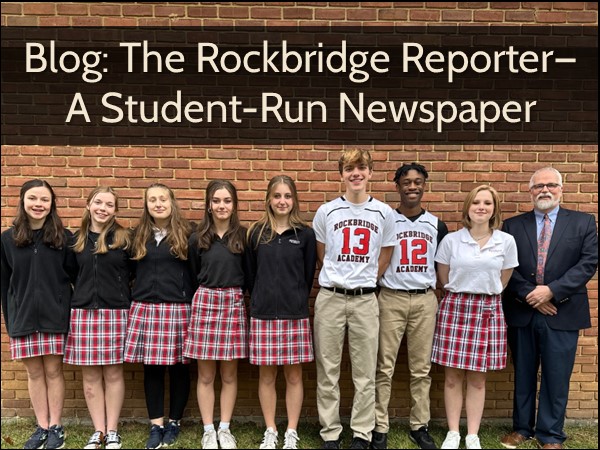
Thomas Jefferson readily preferred a newspaper without the government than the government without a newspaper. Alexander Graham Bell declared the greatest inventors were those who write the newspaper. Presidents and many other notable figures such as George Orwell completely disregarded the newspaper, assuming it was not to be trusted.
With all these ideas on newspapers circulating throughout the country, one may misunderstand the true value of a newspaper. People now don’t know whether to listen to everything the news feeds them, take it with a grain of salt, or throw it in the recycling bin without a glance. People could take the wrong side on important issues simply because one writer presented a fallacious yet persuasive argument or because they refuse to read any article which might actually provide concrete data.
I decided to begin a newspaper the student body can trust; a newspaper that does not satirize our school, yet informs the readers; a place to discuss, learn, and maturely disagree. Although we can’t tackle all the world-wide issues in our small school newspaper, we can still foster meaningful discussions, critical thinking, and responsible reporting.
Will we use this newspaper to manipulate the student body into conforming to our standards? Or keep our “government” in check? No. I hope to find a balance between publishing anything we want and filtering the content in such a way that we avoid real-world problems which we ought to learn to discuss.
In order to maintain this balance, the students run and fund the newspaper. Along with my editor’s board, we write (or enlist other students to write) articles which foster a student’s understanding on different topics or ideas. Through this newspaper, students will use the skills they learn in class and apply them. They will experience real-life discussions outside of a classroom environment. Additionally, because it is student-run, the students will learn to exercise good judgment and prudence as they decide what to publish.
Unlike many school newspapers today, we do not publish our newspapers on the website or online. Instead, we send our newspaper to a printer in order to have hard copies. I think paper copies give the newspaper a certain kind of value and increase the likelihood of someone reading it. Today, we can access a news story with a few clicks on our phone. A paper newspaper brings the student body outside of the world on their phones and teaches them to interact with important issues that don’t necessarily originate from our electronics. The newspaper adds a communal aspect to a student’s day as they gather around the newspaper, especially since students are not allowed to have their phones out during the school day. Additionally, as many people agreed, a paper newspaper is real and lasting. A paper newspaper distinguishes our school from other schools and the culture around us as everything is going digital. However, because we only provide paper copies, the only way to obtain a newspaper is from our school building. You can find our newspapers dispersed throughout the common hangout areas in our school. In later years we hope to create a subscription plan so that alumni and donors can order a copy.
After getting the newspaper up and running, I interviewed a collection of students who I then appointed to an editorial board. The editorial board plans to expand our content and discuss issues concerning race, pronouns, and abortion. Of course, we will have a balance of both heavy discussions and funny stories or reviews.
In the end, my goal with the newspaper is to give students a responsibility, an opportunity to share and build their worldviews, and a place to learn to maturely disagree. One day, the teenagers attending Rockbridge high school will graduate. I hope this newspaper will teach them to formulate and stand up for their worldviews, yet also respectfully and maturely disagree with those who differ from their beliefs.
Hannah Leeman is a current tenth grader. Through the school newspaper she gets to use her passion for reading and writing. She also loves biking and hiking, especially with friends.
How Should We Then Live - An Economist's Perspective

We at Rockbridge intend to continue to use our economics course as one means to foment hope, right relationship with God, and to create a spark in our students that will drive them into conversations, courses, and careers that support not only Godly market relationships, but that also champion truth, beauty, and goodness in any environment.
The Rockbridge Academy economics course policies document states our overarching goal for learning for the year: “The market economy is a gift from God for orderly procedure in a fallen world. Your understanding of this truth and ability to contrast Biblical truth with economic fallacies will be essential to successful navigation of the course.” This statement is distilled from what we at Rockbridge Academy state as our purpose in teaching economics: “The twelfth grade study of economics affords the student the opportunity to sharpen rhetorical skills by integrating a broad range of course formation from mathematics, Great Ideas, and history. The course cadence flows with the first trimester and a half devoted to in-depth study of economic theory and policy as well as training in discerning economic fallacy, both from historical context and relative to current events. The remainder of the course is devoted to history of economic thought, tracing the effects of cultural presuppositions on all aspects of economic behavior, starting with evidencing biblical economics and ending with the modern era of econometrics. The students’ rhetorical skills are honed through instilling the economic way of thinking by reading primary sources, textbooks, and periodicals.
At Rockbridge Academy, we have learned that economics, taught rightly and well in a Godly framework, can be life changing for our students. We make a concerted effort to undo the damage wrought by enculturating the subject of economics as the dismal science. This term was coined by Scottish essayist, historian, and anti-abolitionist Thomas Carlyle in the nineteenth century. Carlyle was influenced by TR Malthus' gloomy prediction that population would always grow faster than food, dooming mankind to unending poverty and hardship.
Clearly, neither Malthus nor Carlyle seems to have been rightly inspired by the Dominion Mandate as stated in Genesis 1:28: “God blessed them and said to them, ‘Be fruitful and increase in number; fill the earth and subdue it. Rule over the fish in the sea and the birds in the sky and over every living creature that moves on the ground.’” Blessed with these commands, placed here in the earthly kingdom, how could we fail to call economics anything but the hopeful science? Here in Genesis 1:28 we see applied economics–how we should live.
Fast forward a couple of tumultuous millenia. We find ourselves faced with real upheaval. Upheaval aptly summarized in a July 2022 essay for World, penned by author Brad Littlejohn. The essay states, “No sooner had the long shadow of COVID-19 begun to recede into the rearview mirror than a new set of clouds gathered on our national horizon. Not since the Great Recession of 2008–2009 have Americans had so much cause to worry about the economy. Inflation has soared to levels not seen in more than four decades and shows no signs of slowing, with the conflict in Ukraine acting as an accelerant to a price spiral that was already threatening to get out of control…” That’s some dismal stuff there. Maybe the idea of economics as a dismal science is not far off the mark.
The author doesn’t stop here with this dismal tirade. He goes on to say, “Most depressingly of all, there now seems no way for policymakers to rein in inflation without making it harder for struggling Americans to borrow and for investors to protect their current savings, much less make a profit. For the time being, at least, most of us can expect to see our savings keep shrinking and our cost of living keep rising—and the worst part is that no one knows how long this season will last.” Yet the author sees something behind these storm clouds, and he invites us to use a hopeful lens to take another look: “…these clouds do have a silver lining. In the midst of an increasingly hostile culture, it can seem harder and harder to make our faith seem plausible and relevant, but the current economic gloom actually presents a powerful opportunity for Christian witness—if we can have the courage to capitalize on it.”
The author chose a key economic term–capitalize–to call Christians to action to be arbiters of hope in a world clouded with gloom. To capitalize means ‘to take the chance to gain advantage from.’ The essay implies that we have a chance to profit from these seemingly disastrous times. Not the type of profit that can be deposited in the bank, but the profit resulting from evangelizing the truth that sets us free to live in right relationship with our creator God. We at Rockbridge intend to continue to use our economics course as one means to foment hope, right relationship with God, and to create a spark in our students that will drive them into conversations, courses, and careers that support not only Godly market relationships, but that also champion truth, beauty, and goodness in any environment.
Littlejohn Brad, Money and Christian witness https://wng.org/opinions/money-and-christian-witness-1657278541
Amy Boswell has been working at Rockbridge Academy for nearly two decades, and she currently teaches Economics. She has four children who all attended Rockbridge Academy.
Classical Christian Math?

If you look up the course offerings at my local public high school, you’ll notice some stark differences between their classes and those offered here at Rockbridge Academy. Instead of Literature of Antiquity, you’ll see English 11. Instead of theology courses like Bibliology and Hermeneutics, you’ll find Honors Comparative Religions. I think it’s probably safe to say that Rockbridge will never offer Business of Fashion. I’m equally sure that, were the roles reversed, someone looking at our course catalog would wonder what in the world Great Ideas I and II are all about!
Despite these obvious differences, there is one area where our course catalogues are quite similar; in fact, every single class we offer in this discipline is also taught at my local public school under the exact same name. I’m speaking, of course, of mathematics. You can find all our classes, from Pre-Algebra to Calculus, at any middle or high school down the street from you.
Does this mean that a public-school math class and a Rockbridge math class are the same? They have the exact same name after all!
The answer is a resounding no!
To be sure, there are many similarities between Rockbridge math classes and public-school math classes. The math concepts themselves do not change of course, and we all want students to be proficient in problem solving and successful in any future mathematical endeavors.
These similarities are far from the whole story, however. There are many differences between Rockbridge math classes and those in other educational settings. These differences arise because we do not have the same educational paradigm. Rockbridge teaches math from a classical, Christian perspective; other educational institutions do not.
What does this look like? Both pieces, classical and Christian, profoundly affect the way Rockbridge math teachers teach our classes.
To teach math classically has many components. First, there is an emphasis on conceptual understanding and eloquent expression of that understanding. We want our students to deeply grasp the concepts they are learning. We do not merely want them to know how to solve a particular problem; we also want them to understand the mathematical principles at play in that problem. Furthermore, we want them to express their understanding in an eloquent way. This occurs through informal class discussion, where students consistently use technical math vocabulary, and through formal assessments such as oral presentations and essay questions. (Yes–you read that right–there are essay questions on our math tests!) Putting an idea into words is an excellent metric to judge true understanding, and we require this often in our math classes.
A second aspect of classical mathematics is an emphasis on history and historical context. We try to give our students a sense of where each concept falls in math history and discuss the important mathematicians who contributed the ideas, as well as where they fit into the larger context of world history. While we are not having daily history lessons (our class time is focused on mathematical content proper!), providing historical context whenever possible is a key component of classical mathematics classes.
A third element of classical mathematics is an emphasis on the integration of ideas, both within our classes and with the rest of the curriculum. Mathematics is an internally consistent body of knowledge, and we want our students to see how each concept they are learning integrates into one cohesive whole. We also want our students to see how mathematics is integrated with the rest of the curriculum. The most obvious point of integration is with science, which uses math as a language to model natural phenomena. While this is the clearest place for integration, it is far from the only place! Mathematics teaches us about aesthetics, much of its vocabulary has Latin roots, it has its own history as I mentioned above, and it engenders many interesting philosophical discussions.
Mathematics can even tell us about theology, or, more properly, theology can tell us a lot about mathematics. This leads us to the Christian component of a classical, Christian math classroom. We believe and teach our students that studying math gives us a glimpse into the mind of the Creator. The consistency, orderliness, logic, and creativity of God are all reflected in math, and in a world where relativism is the ideology of the day, math provides a picture of the objectivity and certainty of God’s Word. By studying math, students learn about the character and goodness of God. Ultimately, mathematics class is an opportunity to worship the creator of mathematics.
We certainly hope each of our students learns a lot of math concepts, expresses them clearly, understands the historical context, and can integrate ideas inside and outside the mathematics curriculum. We hope most of all, however, that our students walk away filled with wonder for our great Creator.
While there are many excellent math classes at schools of all kinds across the country where students build conceptual understanding, hone problem-solving skills, and become equipped for future callings, only in a classical, Christian math class do students get an excellent mathematical education from an explicitly Christian worldview.
So do not be fooled by the fact that our classes have the same name. The classical, Christian math classes at Rockbridge Academy are significantly different from the math classes at the local public school. And we math teachers wouldn’t have it any other way!
Monica Davis has taught all manner of 10th through 12th grade math classes at Rockbridge Academy for the last 9 years. When she is not delighting in math with her students, she enjoys cooking, baking, going for walks, and spending time with friends and family, especially her baby Theo and husband Josh, who is a Rockbridge Academy alumnus from the Class of 2004.
The Why Behind Grand Tour

Ever since kindergarten, my fellow students and I looked forward to Grand Tour as the highlight of our Rockbridge Academy careers. From Latin and history classes to field trips to cultural feasts and soirée dinners, all of our education foreshadowed our class trip to Greece and Italy in the weeks following our junior year. When I try to explain Grand Tour to family or friends outside of this community, I usually refer to it as “a sort of senior trip.” The truth is, though, Grand Tour is not just your typical senior trip—a relaxing week at the beach or skiing in the mountains. Grand Tour enriches both our classical education and Christian relationships within each class.
First, Grand Tour is distinctly classical. We don’t visit England, Germany, Israel, or anywhere else directly involved in our national or religious history; we visit Greece and Italy. This confuses some people: isn’t our recent history more important and influential for us now in America? After all, they would say, Greece and Rome haven’t affected monumental worldwide events for thousands of years. Some of this is true, but, as a classical education emphasizes, what did happen way back when irreversibly shaped the entire western world. We see Greek and Roman culture in our government, art, architecture, language, sciences, philosophy—the list goes on and on. For hundreds of years, as Europe formed out of the chaos of the Dark Ages, leaders looked back to authors like Plato, Aristotle, and Vergil to see how a successful and prosperous country should run, and how its leaders should act.
This past summer, the school worked hard to make sure both the classes of 2022 and 2023 could experience the Grand Tour:

Throughout our Rockbridge education, we study these authors, thinkers, and cultures, tracing their influence all the way to the modern era. Instead of only learning from our immediate past, we go back to creation, where everything began. We then move to Greece and Rome, where ideas and ideals were more developed. Lastly, we see how all these past events have impacted today, where we can make a difference. This is what separates classical Christian education from other models: an integration of God’s sovereign story into every class and all of history.
Second, Grand Tour is not only educational for the mind; it also fosters a precious brother-and-sisterhood between classmates and fellow believers. In fact, I saw the presence of Christ more strongly in our informal Bible study and hymn singing the Sunday we spent ferrying across the Adriatic Sea than in many luxurious cathedrals. Relationally, my whole class grew in leaps and bounds.
In May, before the end of school, the teachers told us to write out our “best selves” and our vision for our class’s “best self.” We then picked two accountability partners, who would encourage us to maintain those best versions throughout the trip. On our way to Delphi about a week into the trip, Mrs. Ball warned us that this was when most classes fell apart and started to get tired of each other’s company. Instead of succumbing to our tiredness and the temptation to do exactly that, we turned it into a joke: “Oh no, Drama at Delphi!” That evening, nothing had happened yet, and we were feeling pretty good about ourselves. Still, Mrs. Ball and Mr. Keehner were not convinced and encouraged us to have “accountability sessions” with our partners in order to check on how we were doing so far. One talk led to another, and soon several of us were involved in deep conversations about our actions as individuals and as a class. We started to realize that we definitely weren’t as relational gracious as we had believed and identified some major problems with our thoughts and actions. We grew closer as we went through this sanctification process together.
That night, and successive rooftop, balcony, and garden discussions, made me more thankful than ever for a strong, supportive community of Christians who are still growing, just like me. On Grand Tour, we shared more of our hopes and struggles than we had ever been able to do before. In fact, I had the privilege of watching a dear classmate come to Christ on the trip; the new light shining from within her almost blinded me, it was so bright and evident. We hope and pray that these class experiences will enable us to better enjoy each other, lead the school, and praise our Savior for His goodness in this coming year.
Jane Farr, ’23, loves playing soccer and various intramural sports at Rockbridge as a break from studying. The rest of the time, she can usually be found reading, playing the flute, or making yummy food to share with family and friends.
Trusting God with College Plans
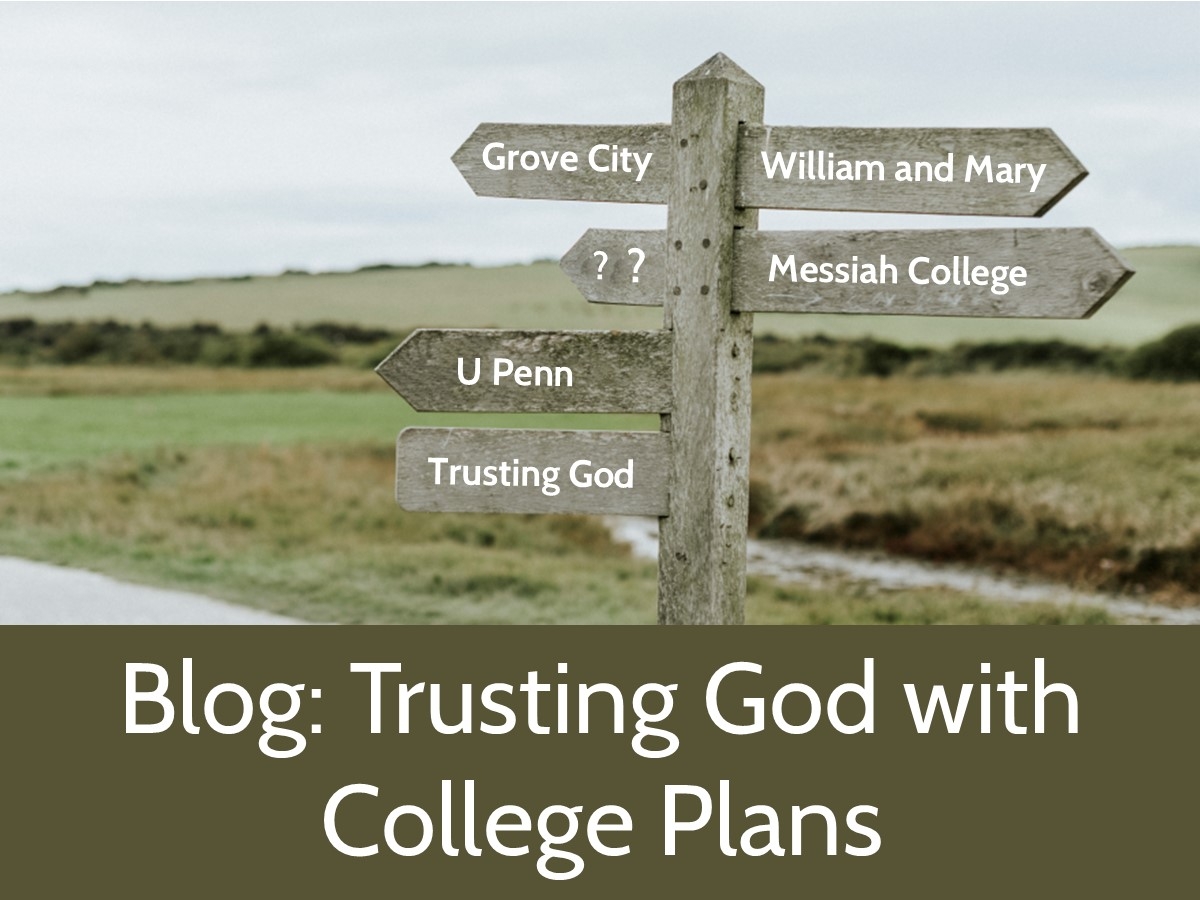
In the fall of 2019, I danced through the halls of Rockbridge with a head held high and a smile secured, for I regarded myself as the early bird who had “gotten the worm.” Before senior year started, I ordered my path for the next season of my life. I applied to the College of William and Mary to study English in W&M’s Joint Degree Programme with the University of St. Andrews; I was accepted and ready to attend before the new year. Even Covid-19, when it came, could not diminish my eagerness for my neatly-crafted plan.
A Zoom bible study early in the pandemic directed my attention to Proverbs 16, particularly verse 9: “The mind of man plans his way, but the Lord directs his steps.” While I nodded along to my peers’ reflections regarding the Lord’s sovereignty despite the virus’s disintegration of man’s plans, my heart stood secure against the truth of the proverb. Blessed, as I was, with rich resources of fellowship and support through my family and the Rockbridge community, I felt little of the pandemic’s mutilation until I left for school.
My first semester revealed not only the virus’s disintegrating effect but also my own pride in planning. By my calculations, if I could only attend a prestigious school, participate in an international program, and do so while achieving good grades and making good connections, I would arrive at a state of accomplished contentment. My efforts, I imagined, would yield happiness.
I completed my supposed prerequisites. Still, my desired result–satisfaction in my work as a student, as well as contentment and spiritual peace in my everyday life–evaded me. When I worked harder, I felt even more discontent.
Upon return after my first semester, the truths I had attempted to scurry away from found me out through various unexpected pathways, such as subbing for my mother’s fifth grade class and working in children’s ministry at my church. Simple truths that I taught to children–including verses like “The Lord is my shepherd: I shall not want” and ideas like “God is in control” and even “Jesus loves me, this I know”–riddled my sense of self-sovereignty.
Over the course of several months, I learned to listen to the Lord as he led me “in paths of righteousness for his name’s sake.” Such listening prodded me to consider that perhaps I, with my perfectly-ordered path towards success, could be mistaken.
Our culture feeds us the notion that mastery over one’s own plans is inherently good. Such self-actualization sates the human hunger to declare oneself “master of my fate, captain of my soul”–a hunger that has been grumbling since Adam and Eve tasted the bitterness of sin. Yet the myth of self-actualization cannot provide sustenance for life or satisfy the soul.
As Augustine wrote in The Confessions, addressing God, “Thou hast formed us for Thyself, and our hearts are restless till they find rest in Thee.” In finding my sustenance and rest in the Lord’s plans rather than my own, I released my schema of prestige and international opportunities and began the process of transferring schools.
Contrary to the notions of our culture, the Lord provided a place for me, as he provides for the birds of the air and the lilies of the field. In the end, I am not, after all, that triumphant early bird with his self-selected worm but a bird fed by my Father.
Submission to the Lord’s rod and staff must not be a singular stance but a daily posture.
C. S. Lewis famously wrote that “relying on God has to begin all over again each day as if nothing had yet been done.” Since transferring to Grove City College last year, I have often reminded myself that submission to the Lord’s rod and staff must not be a singular stance but a daily posture. Surrender, especially of a seemingly-satisfactory schema for success, requires faithful practice, but the Lord has rewarded my surrender, opening further unexpected pathways before me.
The Valley of Vision contains a prayer I often return to during this practice of surrender: “I rejoice to think that all things are at thy disposal, and I love to leave them there. Then prayer turns wholly into praise, and all I can do is to adore and love thee.” May we indeed rejoice as we release our plans into the Father’s hands.
Sarah Soltis (class of 2020) is studying English and classical studies at Grove City College. She writes for GCC's newspaper, The Collegian, and the cultural magazine, Cogitare Magazine. Sarah works as an editorial intern for the online and print magazine Front Porch Republic, and she has contributed to Front Porch Republic, as well as The American Conservative and several online literary magazines. This summer, Sarah will be working at The Trinity Forum, a D.C.-based non-profit focused on cultivating Christian thought on faith and culture.
Three Lessons from the Thesis Process
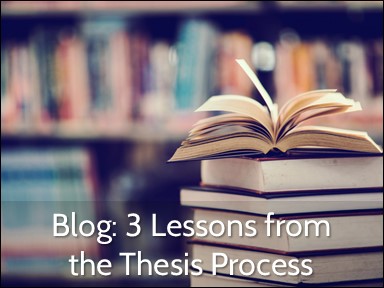
When people asked me “What do you teach?”, I would sometimes say, “A research, writing, and speech class for juniors and seniors. It’s called ‘rhetoric.’” But it is more than that: rhetoric is a capstone of a liberal arts education, and success is measured less in information or skills students acquire (research, writing, speech) than in the kind of people students become. Don’t misunderstand me—we cover a lot of information in rhetoric, from the sonnet structure to the power of MLK Jr.’s “Letter from Birmingham Jail”. . . . But the core of a liberal arts education is for students to become self-disciplined, independent learners who can serve the world with their wisdom. The junior and senior thesis projects are opportunities for students to do just that.
First, the thesis is an exercise in self-discipline. The final product does not come about in a day’s work. Students must determine a worthwhile topic, develop a feasible research question, track down trusted resources, understand experts on all sides, glean pertinent evidence, develop their own ideas, organize their thoughts into an outline, articulate their argument in clear writing, turn their written argument into a compelling speech, present their argument before an audience, and answer that audience’s questions. Don’t worry—we lay out many, many checkpoints, with feedback and instruction along the way. But the ability to accomplish such a project takes practice (part of the reason for including both a junior and a senior thesis in the curriculum), and students who try to track down the necessary sources the night before the note cards are due learn the pain of procrastination.
Second, the thesis is an exercise in independent study. I frequently tell my students that my goal is to work myself out of a job, meaning that I want them to no longer need a teacher in order to learn whatever they want. Students of a liberal arts education should be prepared to tackle the topics that come their way, and the thesis projects are an opportunity for students to put their ability to the test. From nuclear energy to separation of church and state, from embryonic stem-cell research to the value of fairy tales, the thesis topics are as varied as the students’ interests. The thesis shows they have the skills to be lifelong learners, coming to biblically-grounded conclusions with less and less direction from a teacher.
Finally, the thesis is an exercise in sharing ideas with an audience. Over the years, I have been inspired by lines from Rudyard Kipling’s poem “IF”: “If you can talk with crowds and keep your virtue, / Or walk with Kings—nor lose the common touch, . . . / Yours is the Earth and everything that’s in it, / And—which is more—you’ll be a Man, my son!” I want my students to be able to speak before both kings and commoners with virtue and clarity. The Apostle Paul gives a biblical model of this in his own ministry and charges us in Ephesians 4 to use our skills to build up the body of Christ. I know I have been built up by listening to many thesis presentations from my students. They have done the hard work of thinking and writing, and at the end of the year they have shared their work with others through public presentations.
The rhetoric work of Rockbridge students has frequently reached a wider audience through speech competitions such as the Rotary Club 4-Way Test speech competition, the VFW Voice of Democracy competition, and the Association of Classical Christian Schools Chrysostom Oratory competition. These audiences have recognized the excellence of our students’ work on a state and national level. Many students, though, celebrate triumphs that never gain accolades at award ceremonies—persevering through an apparent dead-end in research, finding the perfect phrasing for a sentence, and learning to listen to classmates who disagree and to seek biblical unity on difficult issues.
In his small book The Idea of a Christian College, Arthur F. Holmes captures part of my aim in teaching: “To teach a person to read and to write is to teach him to think for himself, to develop more fully the possession of his God-given powers” (p. 31). In some sense, I am still teaching students to read and write. They are simply reading academic journals and writing a 20-page persuasive essay. But in response to “What do you teach?” maybe I should say, “I am helping students develop their God-given powers,” and I’ve found the thesis to be a helpful tool towards that end.
Emily Scheie is a teacher who is grateful to share the joy of learning with her students. Outside the classroom, you might find her coaching cross country, taking graduate classes in linguistics, or reading for book club (with a mug of tea in hand). She is a sister to six siblings and three siblings-in-law and is an aunt to a growing number of nieces and nephews. She worships and serves with Redeemer Anglican Church in Annapolis and believes, in the words of the poet Gerard Manley Hopkins, “The world is charged with the grandeur of God.”
Why Do WE Read Hard Books?
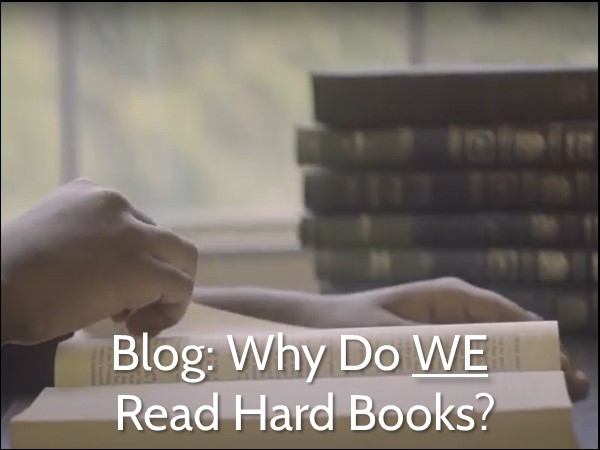
In a previous article, I argued that we should not really have a problem reading hard books. That, “it is hard” is not a fit excuse to avoid it; in fact, the very labor, by strengthening the mind, makes us more fit to read, absorb, and love harder and even greater books, most especially the Word of God.
I wanted to address one other word in the question, though: the word “we.”
Why do we read hard books?
Again, I, too, struggled with Milton, failing three times to get beyond book 2 of the epic. Yet, as I said before, I was largely responsible for pushing to re-introduce Paradise Lost into the freshman curriculum, and that losing the chance to read and re-read that book with Rockbridge students was the great regret of an otherwise wonderful load-lightening which preserved my sanity.
What I did not do was discuss how my attitude changed.
It has to do with “we”.
In the summer of 2008, I was blessed to be in my third year at St. John’s College. Each summer, we would choose a preceptorial—a set of readings and discussions that dove deeper into a particular work than the other courses had time to. Paradise Lost was one of the preceptorial options, and my intention was to avoid it, but my colleague Brad Finkbeiner persuaded me to take it with him.
Eight weeks later, I was hooked. What happened?
The classical methodology happened. We would read one book at a time, independently; our only requirement was that we come back to class equipped with a question we had about the text. (That part was not hard; I had lots of those.) Class began by presenting those questions, the best of which became apparent by how well they drove us into discussing the text, flipping back and forth from one page of the poem to another, comparing lines, trying to understand how a nuance, here, shaped the bigger picture. These were not debates—though sometimes if someone was demonstrably wrong a brief debate might flare up—so much as explorations: explorations of something that was great and good and, yes, hard.
Part of my mistake in reading Paradise Lost the first time was simply that I did not have the intellectual equipment to read it alone: I needed a guide, and I needed companions. Our tutor, Mr. May, was a true guide: more than a referee, much, much less than a lecturer. He fostered discussion that focused on Truth of the text and which demanded that we read more and more closely, discuss more and more carefully, listen to the other students around the table with a more gracious but still critical ear.
The “we” of dialectic happened.
It is that revolving pattern–the lone reader puzzling out the text at midnight (rocking my infant son to sleep), then coming together around a table at which we all sat puzzling about Milton—that pattern is the one that made the hard book not less hard, but less heavy.
Many hands make light work. In this case, many eyes made the work light—what had been dark, I could begin to see...
♦ the beautiful intricacies of Milton’s poetics, poetics that weighed each syllable and how it carried his point…
♦ the goodness of characters like the angel Abdiel, adamant, the lone rebel against a rebellious Satan, “Among the faithless, faithful only hee;/ Among innumerable false, unmoved…”
♦ the Truth as Milton—broken, blind, outcast—could see it: that an infinite God of infinite goodness must overwhelm the evil that seems, in the moment, to overwhelm us…
And that has been the delightful pattern of the last four years: four additional passes through Milton with Mrs. Ward and with these students, some of whom have brains that bend to literature with natural ease, some of whom struggle—but we grow and grow strong. The most powerful insights are not solely or even primarily from the so-called “A” students: they have come, consistently, from those students willing to lean in, to try to figure out what Milton means, what his words mean—not just passively sit and hope I will tell them. They are those with the courage to engage, to test something in conversation, and forgive others when we say dumb things… as I often have. And will let me cull out their mistakes, too, because it is the Truth we are after.
We need each other, more than ever. We need the student in the classroom, the teacher puzzling through this, because we want to know the truth, to live out the goodness, to revel in the beauty.
We need each other as we walk through God’s Word, a Word of more genius than any other—and of more difficulty…. And of more worth. We need the body to help us understand this Word, and then to live it—but not alone.
Ultimately, we need Him: the Father, the Son, and the Spirit to, as Milton says,
“…What in me is dark/
Illumine, what is low raise and support;
That to the highth of this great Argument
I may assert Eternal Providence,
and justify the ways of God to men.”
We need Him in order to take a simple Gospel woven throughout a hard book and share it with a dying, desperate world.
And that is why we—together—read hard books.
Why Do We Read Hard Books?
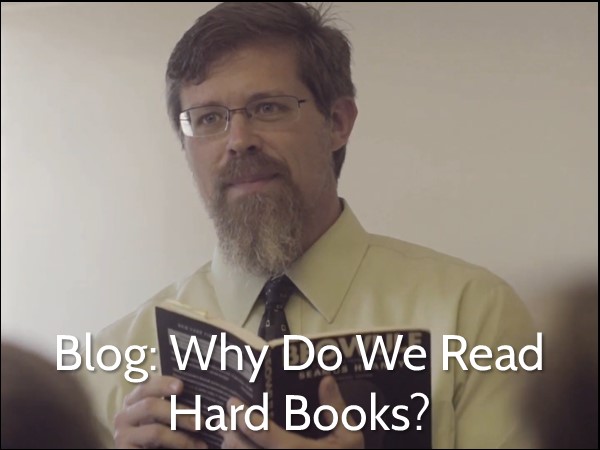
Paradise Lost. The first three times that I attempted to read this book on my own, I failed, never making it out of book 2. I was a literature teacher with several years of experience and at the beginning of my happy career at Rockbridge on my third failed attempt.
It’s a hard book. It’s a hard book, and Milton’s classical allusions, Latinate constructions, and theological asides were completely overwhelming to me, so I quit. I remember waiting at Annapolis Honda for my Civic’s oil change, trying to make sense of the thing. I finally abandoned the poem and comforted myself by asserting that “the Emperor has no clothes”: nothing that was this hard to slog through could be worth it.
And yet…
It is largely my fault that Paradise Lost is in our present 9th grade curriculum; I made my case to Ralph Janikowski and Mike McKenna in 2010, worked to maneuver Pilgrim’s Progress into the 8th grade curriculum to make room for Milton, and then, in the fall of 2011… My class load was reduced, I stopped teaching freshman literature, and I did not have the chance to teach the book for the next seven years. My deepest regret about that? Not having a chance to read Milton’s epic with Rockbridge students again.
And again.
And again.
Because it was a hard book, and it was worth it.
So let me address the question above: Why do we read hard books?
I freely acknowledge that, for their age and relative maturity, Paradise Lost is the hardest book in our curriculum for the students tasked with reading it… and then writing about it. I also acknowledge that, as I defend it, I am doing so from a place of sympathy: I know that it is hard, since I abandoned it several times myself.
Allow me first to challenge the assumption behind the question: “hard” is not the problem.
One of my favorite lines from A Tale of Two Cities describes Charles Darnay’s condition in London. The child of French aristocrats, he abandons their life and the wealth that came with it, moves to London under an assumed name, and is now making his way as a tutor. Dickens writes, “He had expected labour, and he had found it, and did it, and made the best of it. In this, his prosperity consisted.” As anyone who has read the book would know, the life of Darnay – with its labor, with its lower middle class trappings – is infinitely more rich than that of the aristocrats he left behind, at their ease but succumbing to their “leprosy of unreality.”
He chose a harder life not because it was hard, but because it was good.
And Paradise Lost, I will consistently argue, is good. Hard, but good.
In fact, looked at the right way, “hard” is just another way of acknowledging that the task involves cost: time, effort, the restructuring of the mind to grasp what is going on.
Thus, calling something “hard” is not so strongly negative as it first appears. In fact, looked at the right way, “hard” is just another way of acknowledging that the task involves cost: time, effort, the restructuring of the mind to grasp what is going on.
(An aside: what is the greatest benefit of math for any student? That it restructures the mind to think in a more organized, balanced, direct fashion. The constant query of, “When are we ever going to use this in real life?” thus entirely misses the point. In a very particular way, it does not matter if you ever use the quadratic equation again in your life; what you have gained is an ever-deepening ability to think clearly and appreciate something beautiful.)
Video games, which take us where we want to go anyway, are easy, and they alter the mind just as surely as potato chips alter my waistline. Healthy alteration of the mind is hard – as is the alteration of a pot-belly into abs of steel. The better abs, though, are not just useful for attracting a mate; they are actually a by-product of something that is just better for living: a healthy, fit body.
And struggling through math or Milton – leaning into the labor of it – can help to bring about that which is even more useful: a healthy, fit mind.
But people with abs of steel can be insufferably vain: this is true (I say this as a distinctly pot-bellied man). Is the goal of reading a hard book being able to look good because of my heightened mental acuity, just in time for next fall’s academic season? Of course not; the goal is to be able to get at the Truth, the goodness, the beauty that these works contain.
Greater minds than mine have defended the hard books of our curriculum for the goodness, beauty, and Truth found in them. I will add nothing to that here. I will confess that sometimes the complaint that “these books are too hard” arises because these books confront us with our own feebleness in the presence of something great (I write this as a confession of my own sins), and we have developed a society that tears down that which is great. Instead, we should see that, like a good, hard practice under the hot, August sun, the hard book prepares us for that which is even greater, for understanding and thinking more deeply, for going “further up and further in”.
Because the Bible, too, is a hard book, and we abandon the reading of it at our peril.
Instead, we should see that, like a good, hard practice under the hot, August sun, the hard book prepares us for that which is even greater, for understanding and thinking more deeply, for going “further up and further in”.
Critical Conversations: The Benefits of Graded Discussions
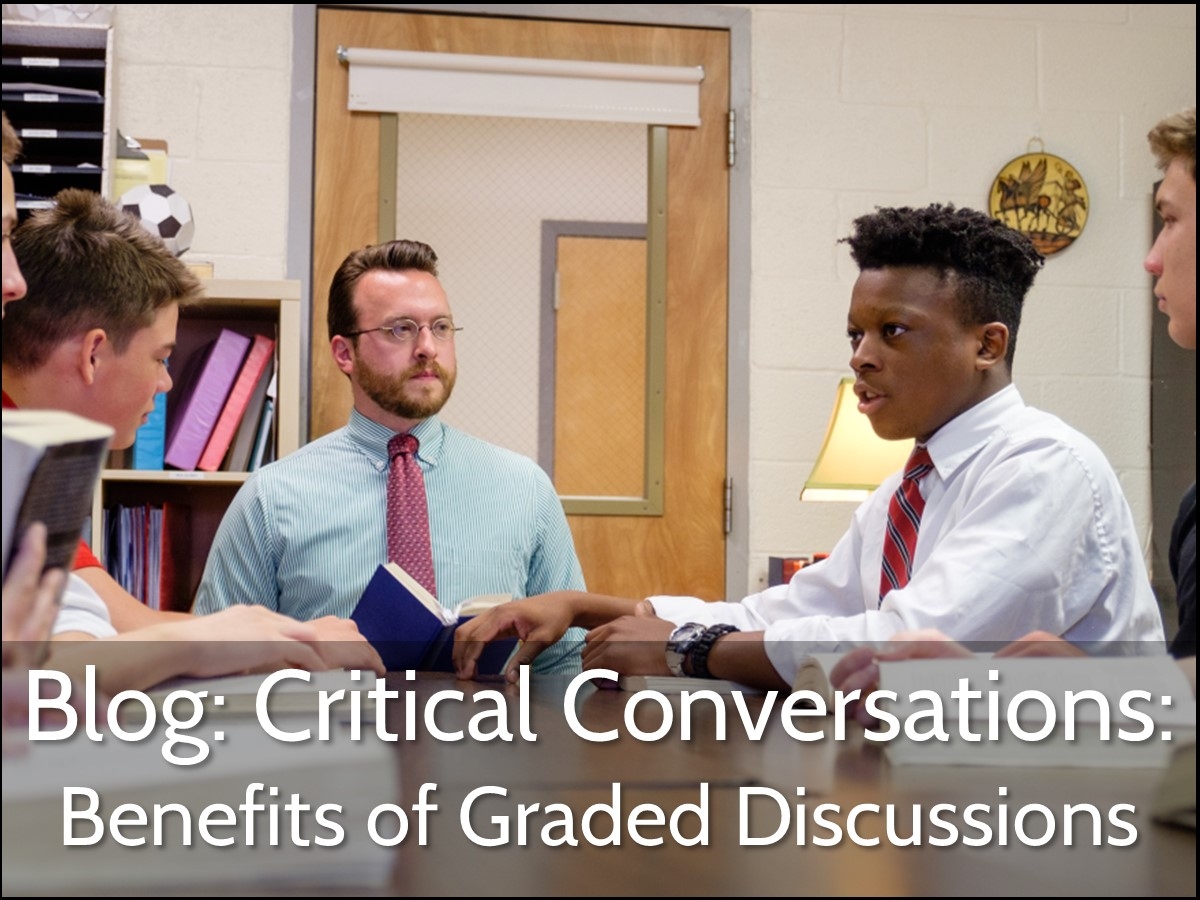
“Graded discussions are a distinction of classical education,” explains class of 2021 alumna Chloe Dubois. “Most ancient Greek philosophical writings are actually dialogues, and dialogues are a form of discussion.”
The phrase “graded discussion” is a staple in a Rockbridge student’s vocabulary. Beginning in seventh grade, teachers will dedicate whole class periods to student-led conversations on various topics. The format of these discussions grows and changes along with the students all the way to senior year. Most seventh grade discussions are prefaced with a preparatory paragraph and frequently involve teacher guidance, but as the years go on, students gain confidence and independence such that, by the rhetoric stage, many discussions are done with little teacher involvement and often little to no preparation. However, the basic principle always remains the same: the students are encouraged to lead the conversation and are given grades based on how often they participate and the content of their participation. Sounds intimidating, right? Maybe at first, but I have gathered the genuine opinions and advice of four Rockbridge students who believe otherwise.
Why discussions? You might be thinking, wouldn’t a lecture from the teacher or reading a scholarly text be a better use of time than listening to a bunch of children talk? There are certainly plenty of lectures and reading going on at Rockbridge Academy, but there are actually quite a few reasons for and benefits to graded discussions that make them invaluable as well.
Emma Williams, Rockbridge senior, said, “I think they [teachers] want us to discover the truth. But, more importantly, I think they want us to learn how to critically but respectfully and gracefully engage with the ideas of others, especially the ideas we don’t agree with.”
I think they [the teachers] want us to learn how to critically but respectfully and gracefully engage with the ideas of others, especially the ideas we don’t agree with.
Graded discussions build skills that are crucial to interacting with other people and ideas. Rockbridge freshman Dominic LiVecche said, “I enjoy hearing what other people—especially Christians—have to say about literature, the Bible, and controversial topics.”
Rather than becoming a competition or a time to show off, these discussions are great exercises in teamwork and collaboration. Ivanna Rhodes, Rockbridge junior, said, “I think they’re good ways to answer difficult questions that are better solved in a group rather than trying to be worked out solely individually.”
These exercises in objective discourse and teamwork make graded discussions great training for experiences later in life. Chloe said, “when applying for colleges this past year, I had the chance to interview with my future professors. Not only was I able to carry on conversation with adults (something I struggled with before Rockbridge), but I also engaged their questions on a level above most of my peers. I even crafted questions of my own. After one such question, a literature professor furrowed his brow, stroked his chin, and remarked, “That’s the best question I’ve ever been asked.” If not for Rockbridge graded discussions, I would have floundered my way through these conversations. Graded discussions taught me to ask and answer questions in a winsome, thoughtful way.”
If not for Rockbridge graded discussions, I would have floundered my way through these conversations. Graded discussions taught me to ask and answer questions in a winsome, thoughtful way.
Experiencing a few graded discussions at Rockbridge will turn these students’ anecdotes into your own lived experiences. But just because they are advantageous doesn’t change the fact that they are different and sometimes scary! If you are a new Rockbridge student, try not to worry. Symptoms of a good graded discussion include a greater understanding of the material, new found respect for your peers, and boosted confidence in your own thinking and opinions. Nerves are normal, but they should go away soon. Emma shared: “I am no longer nervous about discussions because I have realized that it’s not about me and how smart my ideas are but rather about coming to a greater understanding of the truth as a class, and that is freeing!”
Half the battle of graded discussions is the fact that you learn as you make mistakes. You aren’t going to say all the right things, but no one does! Emma suggests that you “listen harder than you talk”, and Ivanna encourages students to be bold saying, “don’t be afraid to be different! If you have a genuine answer to the posed graded discussion question that can be supported, speak it even if it’s not the “popular” thing! You can bring a whole new angle others might not have thought of.” Graded discussions are a distinction of Rockbridge Academy and classical education as a whole because they train us to critically trade ideas in the neverending battle to discover and promote truth.
Cross Country and Life Lessons
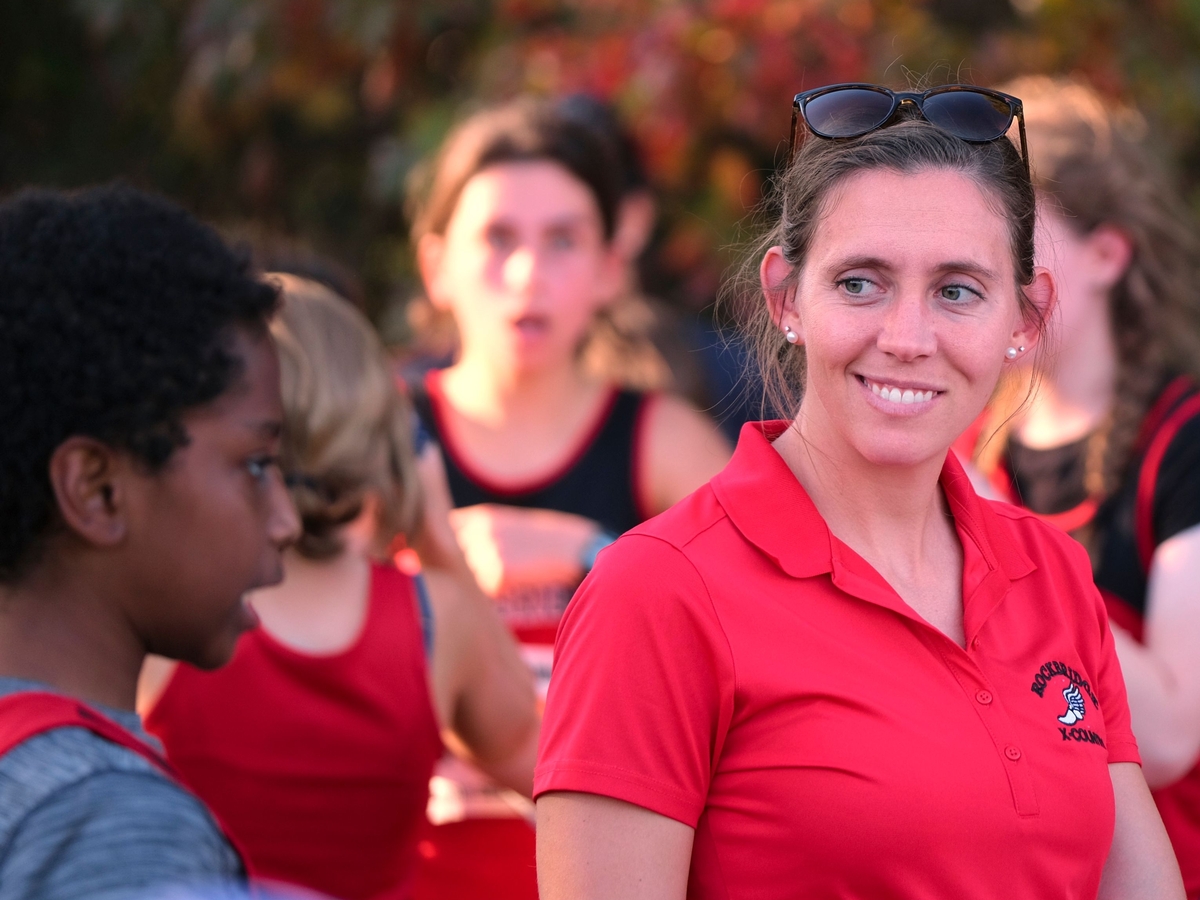
When I was in 9th grade, I puzzled over the final lines of Rudyard Kipling’s poem “IF”: “If you can fill the unforgiving minute / With 60 seconds worth of distance run / Yours is the Earth and everything that’s in it, / And—which is more—you’ll be a Man, my son!”
Running for a minute can’t literally make you mature. But as I am in my fifth year of coaching middle school cross country, I’m realizing that those lines hold a lot of truth. Coaching cross country has been a metaphor for many spiritual lessons God has been shaping in my life.
As you might expect, cross-country shows me the power of courage and perseverance. Students don’t have to be star athletes to join our middle school team. They only have to be willing to work. Drastic improvement is a frequent occurrence on the middle school team. Runners who nearly melted after warm-up in August are running two miles with no trouble by November. A friend reminded me that our college had a T-shirt that said, “Come as you are, leave different.” I would say this is true of cross country. It’s not just showing up that causes you to change, though; it’s the hard work you put in day after day. All are welcome, but be warned—you WILL see improvements if you work.
This is just the obvious lesson, though. It’s the other lessons that I least expected and that I love most. For example, cross-country has taught me to not fear discomfort. It’s pouring rain? So what. We’re running. It’s hot outside? So what. We’re running. You can’t feel your fingers? Don’t worry. They’ll warm up while running. It sounds miserable, right? But somehow, choosing to take on the challenge lets us see we don’t have to be afraid of what life may throw at us. So much of our culture’s mindset is focused on making life comfortable. But choosing to be uncomfortable—choosing to put myself in pain in order to train for the worthy goal of winning a race—shows me how much I miss when I avoid discomfort at all costs.
By not being scared of a few aches and annoyances, I’ve experienced so much more of God’s good earth than I would have otherwise. The fun of leaping over (and in) puddles in the pouring rain. The fall sunset that cuts through the trees with its warmth. The force of the wind that almost blows me over as I stand on the sidelines, cheering on runners as they tear against the wind towards the finish. I would have missed all these memories had I been huddled by my heater instead. And I would have missed these chances to glorify and enjoy God, who made this earth and gave me the life and health to delight in it.
I don’t enjoy the cross country season alone, though, and cross country has taught me the power of a team. Cross country is not a contact sport. But cross country is, nonetheless, a team sport. It would be nearly impossible to train as hard, run as far, and have as much fun as we do during the cross country season if we didn’t have each other: coaches, runners, and parents. We set goals for each other and hold each other accountable for meeting our times. We sing songs for each other and run alongside each other when we are tired. We bring Gatorade and cookies to celebrate races, and we make posters to cheer on our big brothers and sisters on the varsity team. At the end of practice, we huddle together, sweaty and smelly, literally laying our hands on each other, and pray for each other.
We walk through much of life alone, and in cross country no one can run your race for you. But it’s the teammates—who run with you when you’re tired, give an encouraging word when you’re down, and get you a Gatorade when you’re sick after a race—who make it possible to press on. Thankfully, this kind of love doesn’t stay contained to the cross country field. I have made friendships with students, parents, colleagues, and church families, and I know I can lean on them even after the championship race has been run and awards have been given. I hope they know they can lean on me too.
The author of Hebrews, like Kipling, saw running as a metaphor for life: “Therefore, since we are surrounded by such a great cloud of witnesses, let us throw off everything that hinders and the sin that so easily entangles. And let us run with perseverance the race marked out for us.” He saw that this race was not a solitary event; the runner is surrounded by a “great cloud of witnesses.” My cross country runners have witnessed to me about the power of perseverance, the joy that can come amidst suffering, and the tremendous effect the love of a team can have on a person’s attitude about life.
The Class of 2021: Uncertain Year, Unshakable Hope
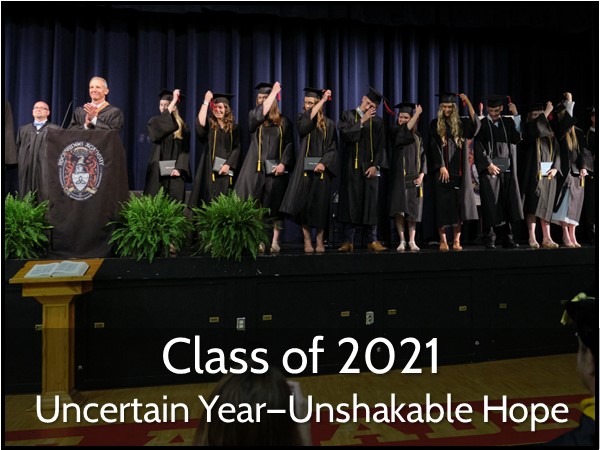
The heart of man plans his way, but the LORD establishes his steps. Proverbs 16:9
The class of 2021’s senior year was characterized by a lot of uncertainty. They weren’t certain that they would come back to school in the fall. They weren’t certain that there would be sports seasons or musical performances. They weren’t certain that they would go on Grand Tour. They weren’t certain that they would even have a graduation! In the midst of all this uncertainty, I had the privilege of watching last year's senior class handle many, many disappointments with grace and a firm reliance on the Lord’s sovereign plan for their good.
One of these huge disappointments was the cancellation or reduction of many sports seasons this year. During the fall months, the seniors led our varsity soccer teams through practices, drills, and scrimmages. Unable to compete in their last season, Captains Luke Sweeney, Christopher Crane, Katie Trovato, and Leah Ball turned the focus to others and faithfully served their teams by preparing the younger athletes for next year’s season. Meanwhile, Jack McLaughlin captained the varsity cross country team in a more-normal-but-still-not-normal season. During the winter months, Captains Marika Skwarek and Luke Sweeney led the varsity swim team in practices and a few meets. In the spring, Rockbridge was able to have a relatively normal season, with Captains Jack McLaughlin and Luke Sweeney leading the baseball team to finals, and Captains Emma McLaughlin, Emily Lawing, and Katie Trovato taking the girls to the lacrosse finals. For every team, each day was a gift because no one was certain they would be there the next.
In the new COVID-world of online AP exams, cancelled SAT’s, and restricted travel, the seniors still had to apply and commit to colleges. Christopher Crane, Ruby Furniss, Leah Ball, and Emily Lawing all drove to different states just to take the SAT over the summer, while others navigated virtual info sessions, tours, and interviews. In the end, God blessed this very talented class with many acceptances to highly ranked universities, trade schools, and service academies across the nation. I remember talking to Kait Atwood and Sarah Daly at lunch one day as they reflected on God’s goodness to them during the college application process. God’s plan for each of them was different than they had initially expected, but they were both confident and joyful that God had chosen paths for them that were far better than they could have chosen for themselves.
Faced with frustrating circumstances like the cancellation of Grand Tour, the seniors found creative ways to serve others, enjoy fellowship, and leave a lasting legacy on the younger grades. In February, the seniors organized a school-wide donation drive to support the West Annapolis Pop-Up Pantry and create some fun competition between the grades. That same month, senior Sean Fitch ran an entire marathon in the freezing rain and sleet, while other seniors and friends encouraged and ran with him during the process. In addition to less formal mentoring of younger students, the seniors continued the tradition of reading books to the Kindergartners every Wednesday. In October, they enjoyed a semi-formal dinner organized by some of their loving mothers in place of their cancelled Junior Soiree. Throughout the year, the seniors gathered to go on hikes and watch the sunrise together. They also organized a senior spirit week and were even able to go on a boat cruise with the junior class for senior soiree. The class of 2021 turned what could have been a disappointing senior year into a memorable one by cherishing the moments they had left with each other and with the Rockbridge community.
It’s been a blessing and a privilege to personally know many of the students in the class of 2021. It was bittersweet for me to see my friends walk across the graduation stage, signifying both the end of their Rockbridge careers and of their childhoods. While saying goodbye is sad, graduation was also a time to celebrate all the hard work these students have done and all the ways they have grown over the years. This growth was most evident to me over the past year. Valedictorian Lera Wilson pointed out in her graduation address that the corona-virus had given the senior class “crowns” of wisdom and honor as they persevered through the difficult circumstances around them.
Proverbs 16:9 reminds us that “[t]he heart of man plans his way, but the LORD establishes his steps.” The class of 2021 experienced this hard but beautiful truth first hand over the past year. In doing so, they served as a testament to God’s sovereignty and faithfulness, both to each other and to those around them. While our world was being shaken to pieces, they reminded me of the unshakable hope we have in Christ. While their circumstances screamed for anxiety and panic, their peace was truly unexplainable. They were only able to continue serving and encouraging others because they were striving towards a kingdom greater than their own.
Congratulations, class of 2021! I’m confident that God will continue to establish your steps as you begin the next chapter of your walks with Him.
Noelle McDowell, ‘22, loves to train and compete with her teammates on Rockbridge’s Cross Country and Mock Trial teams. She is a mega-extravert and loves to do crazy things with her friends and family.
The class of 2021 made final decisions to the following colleges:
Auburn University, The Catholic University of America, Covenant College, East Carolina University, Emory University, George Washington University, Grove City College, Indiana University, Johns Hopkins University, Purdue University, Regent University, Rensselaer Polytechnic Institute, Liberty University, Made Institute, UMBC, U.S. Naval Academy, University of Maryland College Park, University of Tennessee, Washington University, Wheaton College.
The 27 members of the class of 2021 also garnered $4,588,872 in scholarship offers! Thanks be to God.
The Story of Our Experiences Told Through Music
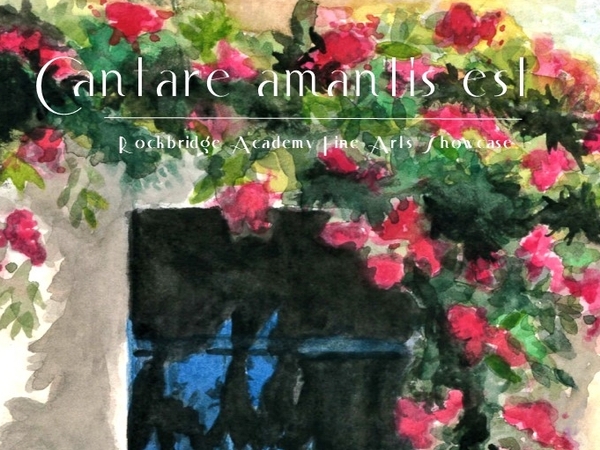
Cantare amantis est~Only the one who loves sings~St. Augustine
2021 marked the first time that Rockbridge had to cancel their annual variety show, inspiring Mandy Ball, music director, to invite students to participate in a musical retrospective show. On May 18, students will perform a collection of acts which musically interpret the story of their experiences over the past year.
Students have selected a wide range of acts which vary from an a cappella ensemble to dancing to songs from popular musicals. The event will be combined with the upper school spring concert and the Rockbridge Academy Art Exhibit will be open to an audience with limited tickets available, at Rockbridge's Evergreen Campus. The combined event is being called the Fine Arts Showcase—a musical, spring concert, and art show in one event. Staff are also investigating the possibility of live streaming the show, for which the details are to be determined.
Ball spoke about her vision for the students' project, saying, "I was hoping they would try to express musically some of the harder aspects of COVID and quarantine and the summer of 2020 because we really went through a lot as a culture." In particular, the acts share students' reflections on quarantine and the summer's tensions resulting from racial injustice. She said that students expressed interest in this idea when she floated it to them, saying, "They seemed to really like that idea of expressing things that they felt during COVID, but also being able to perform a wider variety of styles than we normally would be able to do in a spring concert."
For seniors who have been participating in Rockbridge's music and theater performances for a long time, this provided them the opportunity to have one last hurrah. "I've been doing theater stuff for years now and without something like this there would have been no closure to that," said Sean Fitch, senior.
Leah Ball, senior, also echoed this thought, saying, "It really is a gift that we're able to perform."
Tomi Akinyelu, junior, expresses her thoughts about the show, saying, "It seems like a really fun way to give joy to the community during COVID because we can't meet and do things that are too big." In addition to this being an opportunity for students to tell their stories, hopefully it will bless the broader community as well, by providing a unique artistic perspective of the past year. "I hope that people will be able to look back on this whole COVID period and recognize the good parts of it, the funny parts of it, the parts in which we needed to listen and learn, and the parts where we looked forward to hope," she said.
Throughout this past year, many have seen that even when we are surrounded by unexpected challenges and loss, taking the time to focus our thoughts on appreciating the beauty around us is well worth the effort. Ball described the value she saw in performing this show, saying, "I think it's important to keep fighting for beauty when everything around us looks ugly." She further spoke on this point, saying, "It redeems them in a way, while still honestly giving expression to the pain and sadness that created them."
STEM at Rockbridge Academy

Eighth-grader Theodore Grev had a problem. Every time he camped, his sleeping hammock gave him trouble. Setting up at night in the woods, he couldn’t see to secure the knots for his tarp covering. Sometimes the tarp would blow away in the middle of the night, leaving him cold and wet.
Something had to be done.
When he saw the invitation for the Rockbridge STEM Club (Science, Technology, Engineering, and Math), Theodore decided to turn his problem into a science project. Quarantining at home during the summer COVID shutdown, he built one configuration after another, carefully recording the amount of time it took to set up each model. He finally settled on the best one: it took 8 minutes and 30 seconds to assemble and stayed up all night without fail. This winter, he entered it the Regional Science and Engineering Expo. He and his friends have also started using it on their camping trips, with great success.
Theodore is just one of several participants in the STEM Club at Rockbridge Academy.
Other projects this year have included creating an accurate clock with a 3D printer; designing a walking robot; building a low-pollution cooking stove to save lives in the third world; and testing the safety of personal passwords. The club’s record is strong. Last year, freshman Josh Phillips took home 6 awards for his “Cooking Shouldn’t Kill” cookstove design. The year before that, junior Ryan McDowell took his computer security project to the Intel International Science and Engineering Fair (ISEF) and won a “Cyber Pioneer” honorable mention from the National Security Agency.
 How does this work at a classical, Christian school of only 165 middle and high school students? As STEM fields are promoted more heavily in the culture, classical, Christian schools—usually much smaller than their public counterparts—are often questioned about their ability to measure up.
How does this work at a classical, Christian school of only 165 middle and high school students? As STEM fields are promoted more heavily in the culture, classical, Christian schools—usually much smaller than their public counterparts—are often questioned about their ability to measure up.
At Rockbridge Academy, the curriculum includes a strong STEM track of earth science, biology, chemistry, and physics; algebra, geometry, trigonometry, and calculus; and analytical science and logic, which train students to test arguments and formulate proofs. For several years, Rockbridge students have also participated in the American Math Competition and regional and state-wide Science Olympiads, placing well in both.
The study of science and math is historically classical and Christian—grounded firmly in the liberal arts and driven by a desire to comprehend Creation. Classical educators like to quote Apple founder Steve Jobs: “Technology alone is not enough…it’s technology married with liberal arts, married with the humanities, that yields us the result that makes our hearts sing.”
“Technology alone is not enough…it’s technology married with liberal arts, married with the humanities, that yields us the result that makes our hearts sing.” Steve jobs
At Rockbridge, watching students at work DOES make the heart sing.
Cathy Phillips, a graduate of the US Naval Academy with a degree in aero engineering, started the Rockbridge STEM Club when her son Josh was entering high school. Josh had always had a scientific bent, and she wanted to provide an opportunity for students like him to pursue that bent beyond the classroom.
Mrs. Phillips sees excellence in math and the sciences as flowing naturally from a classical education, which girds students with a strong foundation in facts, then invites them to ask the “why” behind those facts—and equips them to present their findings with skill and winsomeness. She notes that classically educated students typically have a strong desire to learn and a strong background in critical thinking. This translates into excellent questions and the persevering spirit to bring their projects to completion.
This year’s participants are competing in a variety of events: the Maryland Engineering Challenge, the County Regional Science and Engineering Expo, and the Junior Science and Humanities Symposium,
Freshman Michael Grube is building a remote-controlled model cargo ship for the Maryland Engineering Challenge. He’s grappling with college-level math and nautical design, but Rockbridge has trained him in fundamental math concepts that are serving him well. Also for the Challenge, sisters Kait and Maddie Atwood are working with Sean Fitch to design and build a walking robot that walks on 2 legs over uneven terrain. And Josh Phillips created a bridge design for the “Wood Bridge Challenge” category of the competition and won first place!
Theodore Grev entered his practical hammock design in the County Regional Science and Engineering Expo. Seventh-grader Micah Farris, who has always had a bent for engineering and enjoys experimenting on his own, decided to create his own clock with a 3D printer. Both of them took 2nd place. The printing took about 100 hours, and there were long days (and nights) of assembling and disassembling the clock, testing different springs, recording the results again and again. Thankfully, he says, his training at Rockbridge had already trained him to be persistent.
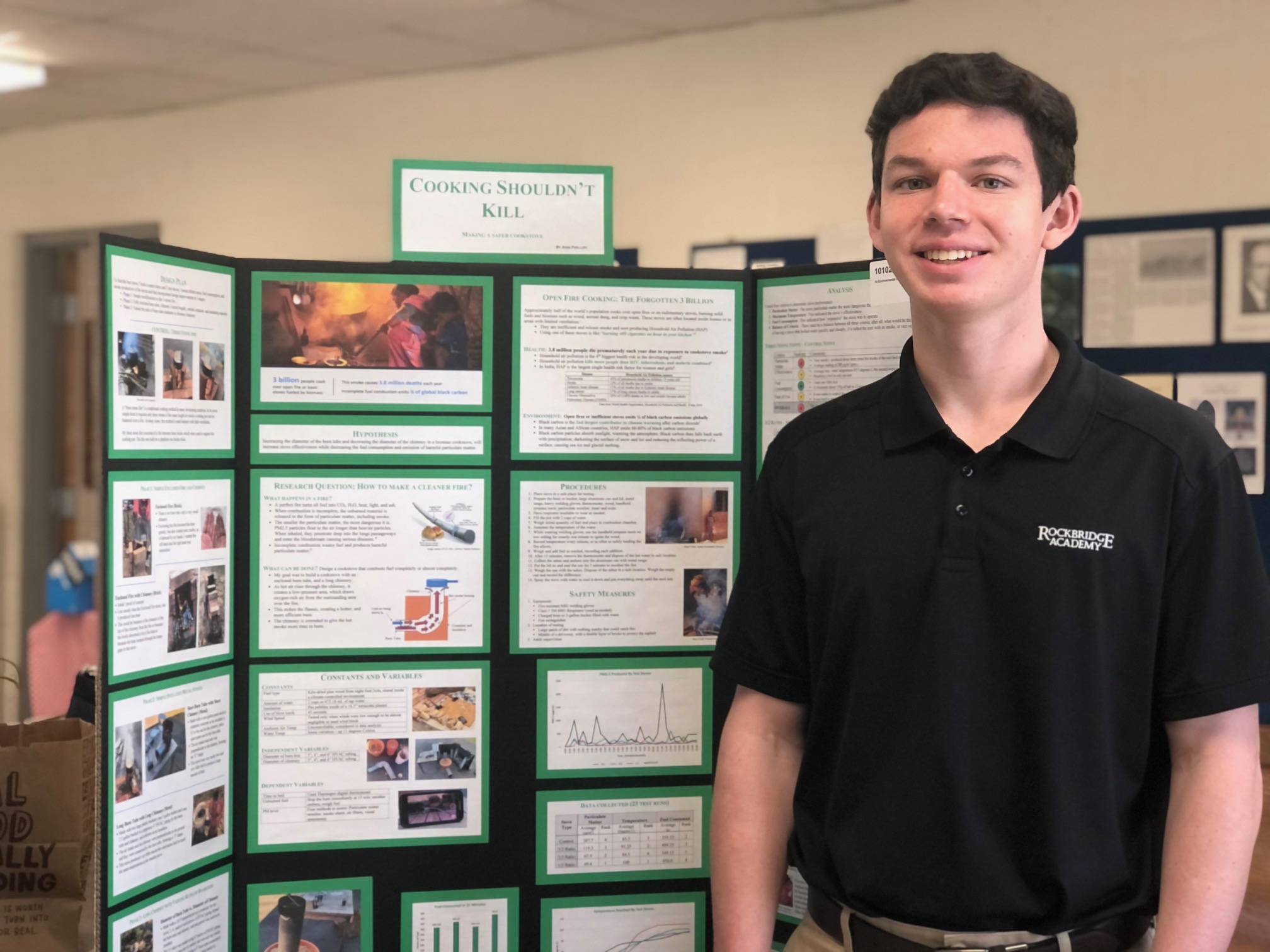 Josh Phillips, who won 6 county awards for his “Cooking Shouldn’t Kill” cookstove design last year, has improved his design and is taking it to the Junior Science and Humanities Symposium (a DOD competition) in 2021. Juniors Emma Williams and Hannah Skwarek decided to examine the effectiveness of common password security questions. After winning the approval of an Institutional Review Board, they conducted multiple interviews, collected online data from their subjects, and determined which questions offer greater security. They are off to compete on the national level.
Josh Phillips, who won 6 county awards for his “Cooking Shouldn’t Kill” cookstove design last year, has improved his design and is taking it to the Junior Science and Humanities Symposium (a DOD competition) in 2021. Juniors Emma Williams and Hannah Skwarek decided to examine the effectiveness of common password security questions. After winning the approval of an Institutional Review Board, they conducted multiple interviews, collected online data from their subjects, and determined which questions offer greater security. They are off to compete on the national level.
Writing and presenting the final project for a panel of experts is a major component of all of these competitions. Yet the students consistently expressed that that was the “easy part.” At Rockbridge, they’ve been honing those skills for years.
While small classical schools may not offer a wide array of specialized math and science classes, they do offer classes that are rigorous, deep, and integrated with one another. In a STEM world that changes with blinding speed and often denies the existence of God, classical Christian education trains adept and willing learners—all while affirming the beauty of creation and greatness of the Creator. These competitions don’t just introduce students to a STEM network of friends and colleagues; they also give them opportunities to shine the light of Christ to a world that needs Him.
Why NOT Latin?
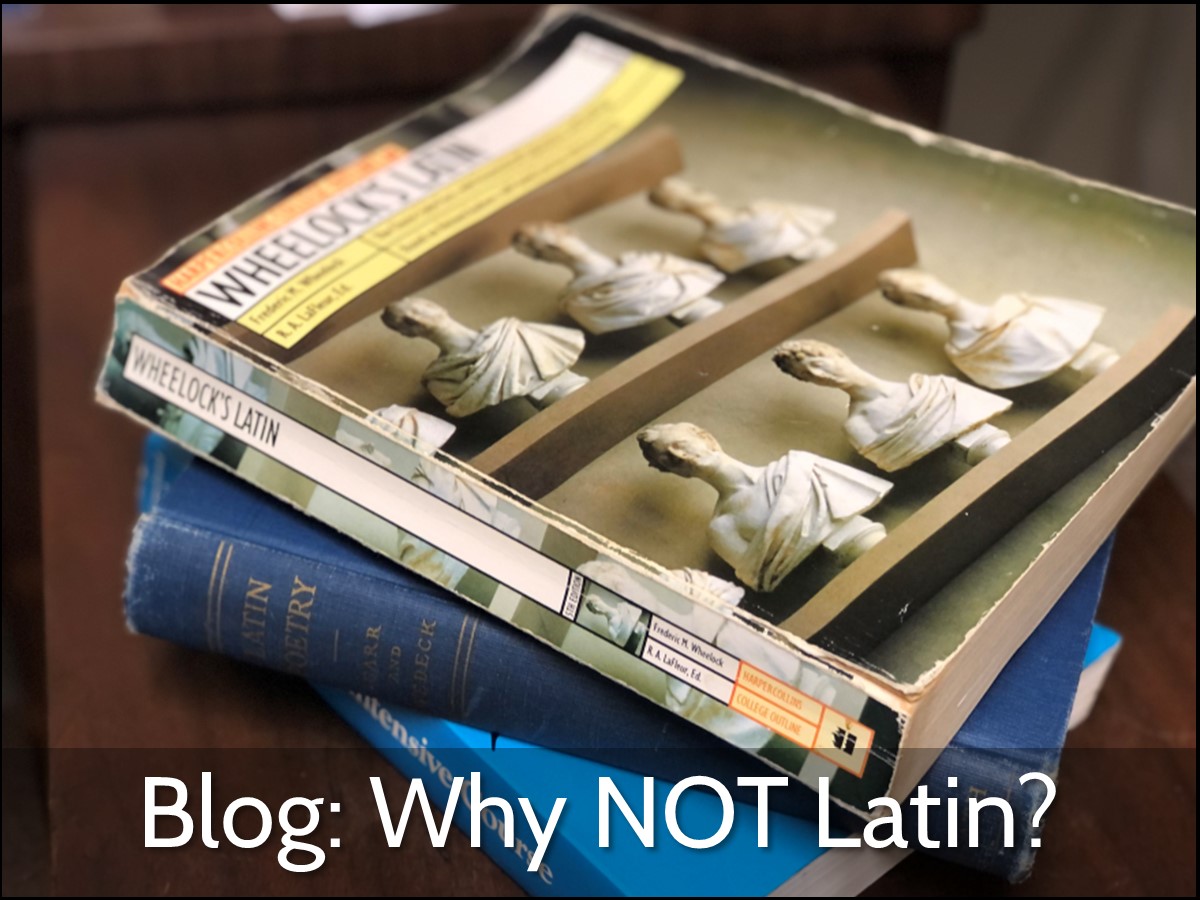 At some point (or multiple points) during the school year, every Latin teacher will be asked the same question. Sometimes we encounter it at parent-teacher conferences, in the classroom, or we are asked to speak on it at back to school nights. We reach for our perfectly scripted and practiced answer that we have used time and time again when asked “why learn Latin?” This answer usually includes a list of 5 - 10 reasons ranging from the connection to English grammar and etymology, the integration with literature, history, and philosophy, and the different levels of practicality for future studies. While all of those reasons are true and valid, the reasons to study and even master Latin are far more significant and rewarding than those already mentioned. Before I go into what they are, let me point out a few things about education in today’s schools.
At some point (or multiple points) during the school year, every Latin teacher will be asked the same question. Sometimes we encounter it at parent-teacher conferences, in the classroom, or we are asked to speak on it at back to school nights. We reach for our perfectly scripted and practiced answer that we have used time and time again when asked “why learn Latin?” This answer usually includes a list of 5 - 10 reasons ranging from the connection to English grammar and etymology, the integration with literature, history, and philosophy, and the different levels of practicality for future studies. While all of those reasons are true and valid, the reasons to study and even master Latin are far more significant and rewarding than those already mentioned. Before I go into what they are, let me point out a few things about education in today’s schools.
There is a shift happening in education. This shift is not a new one, but a slow and gradual progression spanning many decades. The progression is a movement away from education for the sake of character and well-roundedness to education for the sake of specializing and salary. The purpose of education in today’s schools is becoming increasingly utilitarian. If subject X does not directly yield a certain dollar figure in the student’s future paycheck or a tangible increase on the SAT, then the benefit of spending time and effort studying subject X is called into question.
I think it is safe to assume that those reading this article find value in the classical model of education. Classical education strives for a balance and unity of a student’s character and their functional intelligence. By equipping students with a multi-faceted and dynamic curriculum, classical education and, especially, Christian education offers students a humble appreciation for the beautiful world around us and the intellectual aptitude to grapple with it from all vantage points. Focusing on the utilitarian benefit of education alone quickly eliminates many studies and practices that have immense benefit to the formation and education of children. I'll give an example.
Most children in America grow up learning an instrument and playing a team sport. The reason for this is not, in most cases, because their parents feel confident that their children will be professional musicians or athletes one day. The reason they are enrolled in these programs is for a less utilitarian, but equally beneficial reason. Those programs equip and train children in skills that they will find rewarding in all areas of life down the road. The skills of teamwork, discipline, attention to detail, leadership, and even humble failure will not only give them greater success academically, but also socially and professionally as well.
In the same way, Latin equips students with equally important skills, not to mention that it unlocks more depth and integration with their other areas of study. Latin encourages the cultivation of indispensable character values as well as more practical, educational skills. Memorizing Latin vocabulary requires discipline and hard work. Understanding Latin grammar and parsing sentences requires logic and deductive reasoning.
Translating original Latin texts requires attention to detail, critical thinking, and the humility to continue to grapple with the text even if you fail the first several times. Going beyond these practical skills, the integration, depth, and richness that Latin offers should not be overlooked.
These values not only benefit the character of each student, but also serve to broaden and deepen their understanding of the world around them. One might ask the question though, “why not spanish or french?” While the study of any language yields immense benefits to students, Latin links us with history, art, philosophy, literature, and theology in ways that no other language can. Consider the following question.
How many parents would be impressed and would deem the education “worth it” if our students could do the following: If they could walk into the halls of Harvard and be able to read the Latin inscriptions of the walls? If they could leave their biology, pre-med, and pre-law classes with a deeper understanding because all the terminology is in a language they already know? If they could travel abroad and pick up the language easily because of their foundation in Latin? If they could read T.S. Eliot with a greater appreciation because they understand the mythological and historical references? If they could hold their own in a political or philosophical discussion because they had not only read, but translated Cicero, Livy, and Caesar? All of these examples to say, how many parents would deem their child’s education successful if their student were practically and philosophically prepared for any area of study or conversation? The utilitarian benefits of a subject have their place, but fall flat when divorced from its connection and integration with the rest of the world. The practical skills that Latin affords students as well as the part it plays in the broader conversation of western heritage make it a seamless and natural addition to the classical curriculum.
When I think about all the skills and richness that my 15+ years of studying Latin has brought to my education, all I can think in response to the question “why Latin?” is “why not Latin?”
Melissa (Caton) Lentz, ‘08, graduated Rockbridge as the first female to attend K-12. After studying English and Latin at Hillsdale College, Mel came back to teach Latin at Rockbridge for two years. She now lives in Dallas, TX with her husband, Jon, her two boys, Jackson and Calvin, and their daughter, Penelope.
The History of Oral Exams at Rockbridge Academy

“It’s a historical method on how to examine someone and their rhetoric. It’s all about being articulate, thinking on your feet, putting together your thoughts, integrating your subjects, and expressing your world view.” That’s how Rockbridge’s Headmaster, Roy Griffith, described Rockbridge Academy’s oral examinations. These graded conversations between two teachers and a student are Rockbridge’s unique version of midterms. Every rhetoric student is assigned a fifty-minute slot in which they verbally answer questions about any material from across the subjects they have studied that year. Exams are most successful when students integrate information from multiple subjects in their answer while weaving in their Christian worldview. Thanks to the ingenuity and hard work of the Rockbridge Academy staff, oral exams became a tradition that has been benefiting our rhetoric students for years.
Back in 2007, the Rockbridge staff was struggling with the idea of exams. Midterms and finals felt like time consuming disruptions to learning, but the students' understanding of the material still needed to be assessed. Mike McKenna, Rockbridge’s Headmaster from 2000-2015, said, “We started by asking the question, "Why?" Why midterms and final exams? Do we have to do it the same old way that everybody does it?” It turns out, the answer is no. McKenna said, “We wanted to think outside the box to come up with a way to assess the students' understanding of what they were learning, but we also wanted to do it in a way that was in accordance with a classical model.” Ralph Janikowski, who was Rockbridge’s upper school principal from 2005-2016, came up with the solution that fit all of these criteria: oral exams.
The oral exams concept put Rockbridge into relatively uncharted territories in the world of high school. As far as Rockbridge knew, no one else—not even other classical Christian schools—were doing something like this. Rockbridge made oral exams more casual than typical midterms by encouraging students to take the conversation in the direction of a subject matter that interests them and to articulate the thought process behind what they are learning and why it is significant rather than asking obscure questions or simply getting the student to parrot information they have memorized. Heidi Stevens, a retired Rockbridge art teacher who was on staff at Rockbridge for twenty years, said that orals were originally meant to be something you could do without having to study; if you paid attention and participated in class you would be fine.
McKenna said, “I always wanted the students to feel like they were having a dinnertime conversation with Uncle Mike about what they were learning at school.” Despite this, the students are understandably intimidated in their first year of exams. But it seems that as the years progress, the students become more and more comfortable. Each sophomore class is almost always nervous, but juniors are usually a bit more comfortable, and seniors tend to enjoy the experience. Oral exams are actually more convenient for students because, “rather than taking an hour written exam in each subject over the course of a day or two, now they [have] a fifty-minute conversation with their teachers. And then they [are] allowed to spend the rest of the day getting some solid work done on their thesis papers,” said McKenna. Oral exams ended up being exactly what Rockbridge rhetoric students needed, in so many ways.
Fast forward fourteen years, and oral exams are still going strong, much in the same manner that they began. Two teachers still act as interlocutors, terrifying sophomores and exciting seniors for their fifty-minute graded conversation. Through the years of doing oral exams, the benefits this unique test offers have become apparent. The testing method itself gives the student more freedom to express themselves and what they believe. McKenna put it this way: “If I talk to you about your view of mathematics I can see whether you understand it from a biblical perspective or not. But, if I put a trigonometric equation in front of you and ask you to solve it, you could be a Secularist or a Christian and still solve that problem. I won’t understand your worldview.” Having a worldview and being able to winsomely express it is an important part of Rockbridge’s education.
In a blurb about oral exams in the 2007-2008 Rockbridge Yearbook, former Rockbridge teacher Donna Duarte said, “‘Orals are an appropriate form of evaluating a rhetoric student’s progress, and the goal is to indicate how the student is progressing toward an integrated biblical worldview.’”
Oral exams also provide students with ample future benefits. Nathan Griffith, Rockbridge teacher and former Rockbridge student, said, “Orals are preparing you to have a long conversation about topics you may not be comfortable talking about,” and also that “it’s a great opportunity to get comfortable talking to someone in authority over you.” Being able to think through difficult questions as well as verbally articulate answers are valuable life skills.
Emma Williams, Rockbridge eleventh grader, said, “I can just picture myself being really nervous for an interview or something, but now I will be much more confident having done orals.” Oral examinations fit perfectly into the rhetoric years as they test both knowledge and oratory skills, allowing a student to weave together what they have learned with their worldview. Oral exams are the optimal midterms for Rockbridge Academy because the integration that naturally occurs demonstrates that a classical education is a Christ-centered education.
Olivia Reardon, ‘22, loves to write and can usually be found reading a good book. She is part of a dance company and enjoys spending time with friends and eating ice cream.
Debate: Adaptability to Overcome Disappointment
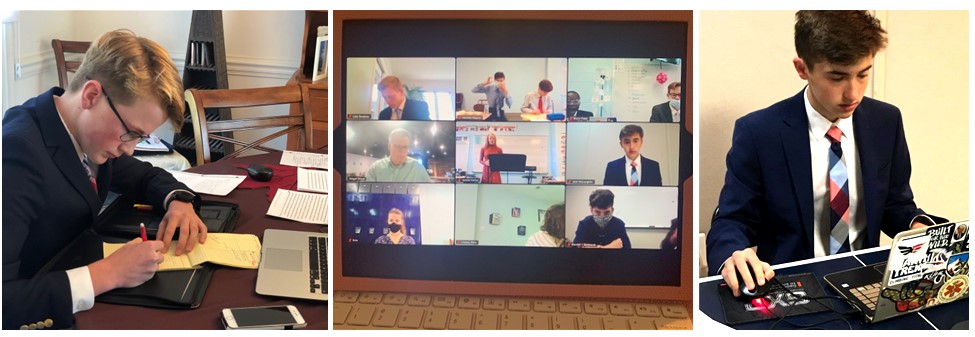
During a normal year, the Rockbridge Academy debate team would travel to Virginia and stay at the Lawings’ grandparents’ home for a weekend of debating at Summit Christian Academy. However, it has become exceedingly obvious that 2020 is anything but a normal year. Due to Covid-19, the three schools participating in the tournament were already restricted to Zooming into the debates from their respective school buildings. But a last-minute Covid-19 closure at Rockbridge meant that all our debaters were forced to pivot once again and debate from their homes. As a first year debater and student used to Covid related disruptions, I prepared myself for a disaster. But Rockbridge debaters made it happen, communicating with their partners on the phone during prep time and presenting their cases from their home offices, bedrooms, and basements. Despite this unpredictable year, the debate team has had a rewarding and successful start.
So many things have changed this school year, but the benefits of debate have remained steadfast. Whether you are a novice, JV, or Varsity debater, there are opportunities to learn and hone skills. Trinity Jordan, Rockbridge eleventh grader and first year debater, said, “It definitely brings me out of my comfort zone because I don’t like to put my opinion out there a lot, but debate has caused me to be more confident in what I say.”
Being able to think logically and compose winsome arguments are extremely beneficial skills. As Michael Grube, Rockbridge ninth grader and second year debater, put it, “People these days don’t really argue what is true; they just argue what they feel. So debate is really good at teaching you how to argue truth through reasoning and support for your arguments.” In just my first few months of debate, I have become much more confident in my ability to think and respond on my feet.
Luke Sweeney, Rockbridge senior who has been in debate since eighth grade, said, “It definitely helps with listening and being able to compose clear, coherent arguments on the spot, because in almost every debate you get an argument that you’ve never heard before and in the next speech you have to give a refutation.” In other words, you have to be adaptable. Debate teaches students how to think on their feet and adjust quickly to new information or an unforeseen situation. I truly think that the training and preparation we did in debate class better prepared the team to pivot last minute and make debating from their homes work. Doing debate serves so much more of a purpose than just filling the elective slot. It prepares you to think critically and respond persuasively in real life.
Despite the less than desirable circumstances, the Rockbridge debate team has had a successful year thus far. In Varsity, Luke Sweeney and Jack McLaughlin won third place. In JV, Michael Grube and Kait Atwood won first place and Nash Bailey and Olivia Reardon won third place. Perhaps the biggest success however, is how the debate team has been able to build community with one another despite Covid-19 restrictions. Going outside, playing games to improve our speech and improvisation, and preparing for the tournament with one another has brought students from all different grades and debating experiences together. Jordan said, “It is a really uplifting community. I especially noticed it when we were doing our practice debates; they give us a lot of constructive criticism but in the nicest way possible.” The Rockbridge Academy debate team was able to overcome unanticipated obstacles and participate in a successful debate tournament by allowing our plan to be adapted to God’s perfect one.
Olivia Reardon, ‘22, loves to write and can usually be found reading a good book. She is part of a dance company and enjoys spending time with friends and eating ice cream.
VLOG: Pointing Students to Christ: Mr. Northup on Teaching Bible at Rockbridge Academy
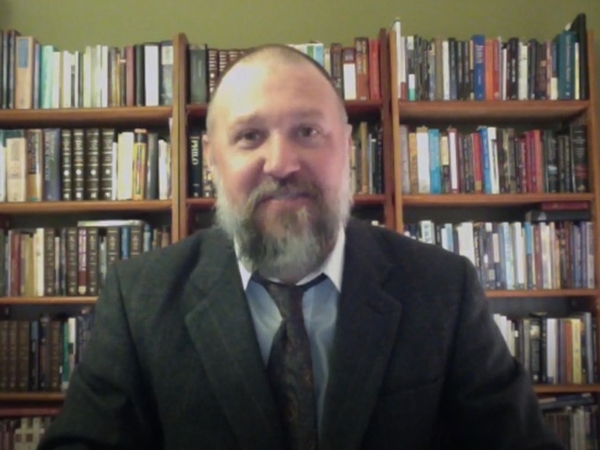
Since 2005, Mr. Nathan Northup has been faithfully teaching Bible at Rockbridge Academy in the upper school. He shares IN THIS VIDEO the heart of why we teach Bible at Rockbridge Academy. More than Bible knowledge, our desire is that each and every student would see and know and love Jesus, our Savior, and that they would be able to evaluate their whole range of life experiences in light of the Scriptures.
Mrs. Williams--Aiming High
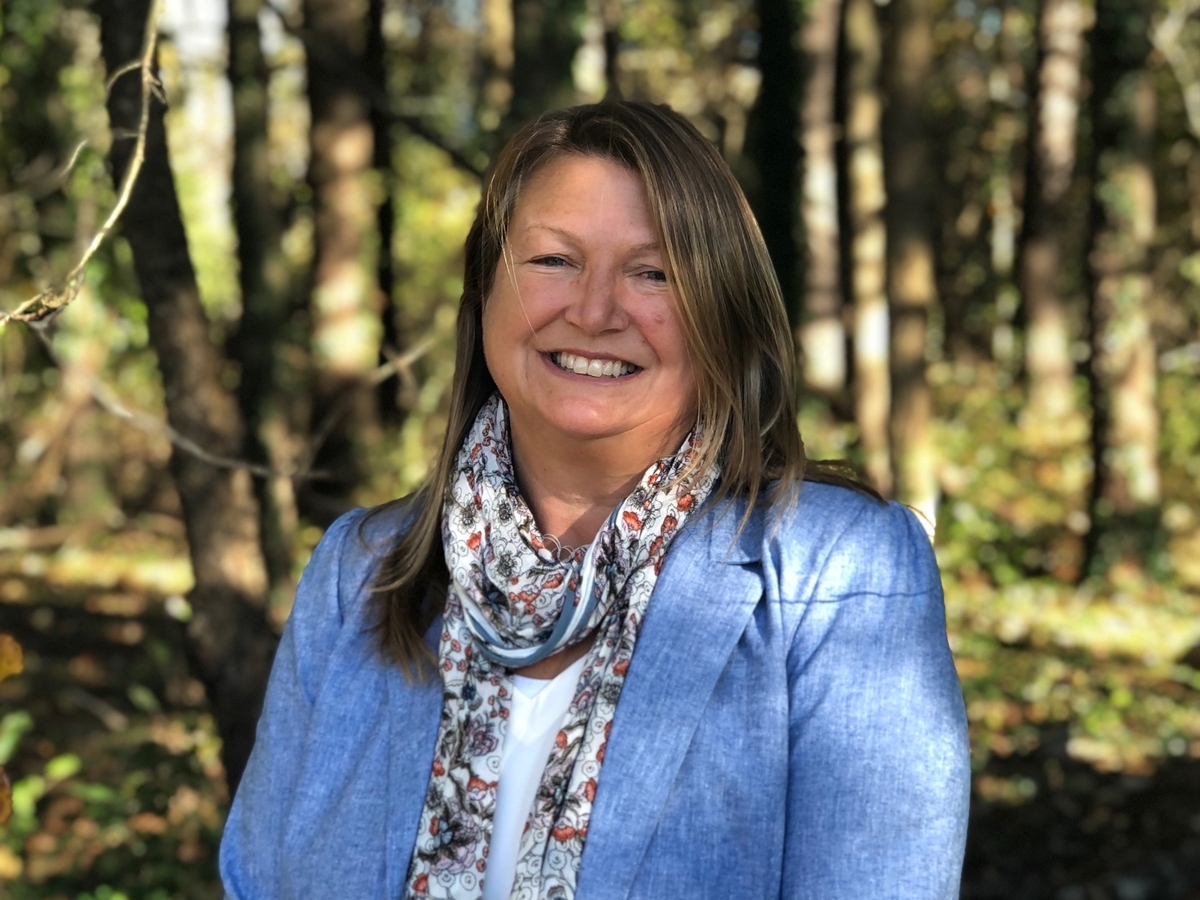
Mrs. Kim Williams is never without a mission. Whether she’s piloting airplanes, teaching medieval history in a 4th grade classroom, or raising her three children, she approaches her duties with determination and humility, giving God control of the cockpit. Many of us have benefited from her time teaching at Rockbridge—first 4th grade, now 10th grade Bible. But before she ever graded our papers, she served in the United States Air Force.
Mrs. Williams joined the Air Force when a recruiter came to her high school. Not only was joining the military a way to pay for college, but it offered her a chance to see the world and serve her country. She served 23 years total, 10 on active duty.
While on active duty, Mrs. Williams participated in several missions, but she especially remembers piloting the KC-135, “which was basically a big gas station in the sky,” she said. It flew in a circle at a fixed location waiting for planes to refuel. Sometimes, these planes would meet from two different Air Force bases across the country. Mrs. Williams described this meeting of two airplanes connecting mid-air in the same piece of sky as “a controlled collision.”
When she first became a mother, she left active duty and joined the Air Force reserves. During this time, she worked at various military bases, including Andrews Air Force Base and even the Pentagon. While at the Pentagon, she worked in the “Lessons Learned” office, where the Chief of Staff sent her team to various active duty units to interview soldiers who experienced an event or were part of a project that had remarkable mission impact. Gathering and publishing lessons like these could then educate or benefit the rest of the Air Force. “Maybe there was a big success story in a unit,” she explained, “and he might say, ‘Go capture why this was such a success. What made it a success?’” Along the way, Mrs. Williams learned her own lessons.
“Being in the military gave me confidence to try something new,” she said. “You’re always having to do something new. You just say, ‘Here I am, let’s figure it out.’”
While still in the reserves, she was called on an additional mission—teaching—a job she approached with the same can-do attitude. When she brought her daughter, Sarah, to Rockbridge Academy, she became interested in the Rockbridge mission. “I watched the teachers and how they had such a big influence on the young people they served,” she said, “and I thought, ‘Wow, this is a pretty neat mission, and I want to be a part of it.’”
At first, she thought she’d teach in the upper school. But when Mr. Mike McKenna, former Rockbridge headmaster, told her she’d teach 4th grade, she thought, “What in the world?” However, she soon came to love the age. “I love how they love you,” she says. “They’re not self-conscious, they’re just themselves. So, when Jesus says come to me like little children, this might be what he means, to come with hearts wide open, humble, and beautiful.”
Mrs. Williams taught 4th grade for 9 years. This past year, she transitioned to teaching the 10th grade Bibliology and Hermeneutics class. She taught many of her current 10th grade students when they were in grammar school, “so they know I’m crazy already,” she laughs. Despite the age difference, she hopes to integrate aspects of her 4th grade Bible curriculum into the 10th grade lessons, primarily using the book of Isaiah. Since Bibliology focuses on ideas, Isaiah will help her refer to tangible examples of those ideas. “God must have done that,” she said. “He puts these things on your heart.”
“It brings me a lot of joy to help people in the next step of their journey,” she said. “To watch people grow was more fun than flying airplanes, which perhaps not a lot of people would say.”
Mrs. Williams doesn’t fly airplanes anymore, but she still aims high. “Be ready for adventure,” she advises students. “Have a positive attitude in the midst of it, and be flexible, and have eyes to see those around you.” Though no longer serving in the Air Force, she’s still serving the Rockbridge community, and her unstoppable mission remains: pointing students towards the Lord.
Running Through Adversity

Lauren Bailey views every opportunity to run as a privilege. While Lauren's teammate for two years, I would be nervous on the starting line right before a varsity cross country race, and she would remind us to appreciate the chance to run. Even now that she has graduated from Rockbridge, this mentality has stuck with our team.
Lauren Bailey is a 2020 Rockridge graduate, who is now a freshman studying at Loyola University and running on their Division I cross country and track teams. She started running in fourth grade and has loved it ever since. Since the Bailey family lived at Belvoir while Rockbridge owned it and held cross country practice there, she joined the middle school for practices often in fourth grade, officially joining the team as soon as she could when she entered fifth grade.
Despite her love for running, her running career came with the setback of frequent injuries. "It was my dream to run in college," Lauren told me. Yet her injuries made it difficult for her race times to progress systematically, stunting the potential for colleges to be actively recruiting her. Because of this, "I just assumed that I couldn't [run in college]," she said. Now that her dream has come true, however, she told me: "to say that I'm excited is an understatement."
Lauren originally applied to Loyola University without expecting to try out for cross country. She valued the school's community atmosphere, along with the liberal arts education offered there; she is double majoring in political science and philosophy. When training this summer, her plan had been to try to walk onto the cross country team as a sophomore, yet she decided to reach out to the coach this year instead, thinking, "the worst that she could've said was no." Lauren showed the coach her times and training logs from the past few months, and was interviewed by the coach over Zoom. In addition, making the cross country team necessarily means she will also participate on the track team, which is ranked Division I as well. Covid-permitting, the team plans to travel rather extensively along the east coast region in the regular season and to Arkansas, Oklahoma, and Boston for the larger meets.
Over Lauren's many years of running for Rockbridge, Mandy Ball, head coach of varsity cross country, watched Lauren's love of running blossom. Formerly the physical education teacher, she encouraged Lauren to join cross country after watching Lauren run the timed miles in PE class. When asked to describe Lauren's running personality, Ball said, "She's a tiger, I think." Explaining what she meant, she added, "For her, the more adverse the conditions, the better she performs." Recalling the numerous times Lauren got injured, Ball pointed out: "She kept coming back."
Two of Lauren's favorite memories were from her junior and senior year. Lauren remembered the varsity team's trip to California in her senior year, saying it "was absolutely unforgettable." She happily spoke of the team atmosphere, saying, "I loved all our inside jokes." In addition, unlike many of her teammates, including myself, she described a 2018 race in Northern Virginia as “my most favorite race in the entire world." Due to excessive rain, this Saturday meet is remembered as “the mud meet.” It is also where Lauren first led the team in informal zumba.
Sydney Hudson, a junior on Rockbridge's varsity cross-country team, recalled how Lauren led the team in zumba before a race as an effort to "keep us warm on the start line, calm our nerves, and make us laugh."
Often seniors find themselves wondering what legacy they will leave. Lauren's love of running truly shone through, encouraging those around her. "Lauren had such a love for running and it was infectious. Running brought her so much joy," Hudson wrote. "She viewed running as a blessing, whether easy or hard. She truly emulated to us what it meant to run for the Lord and His glory." Now, Lauren continues in her pursuit of running, setting an example in joy and perseverance.
A Great (Mathematical) Adventure
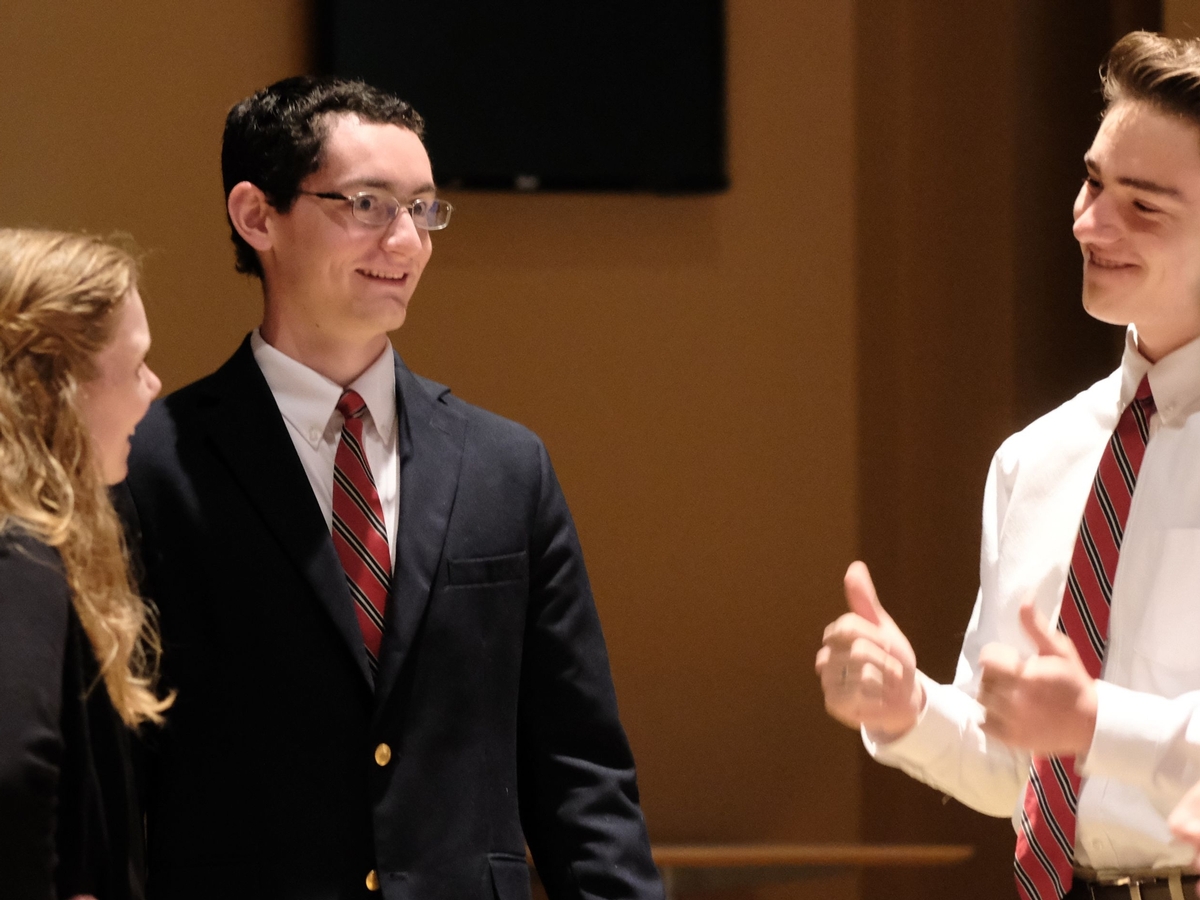
Rockbridge math prepares students to embark on the adventure of studying math as a product of God’s character and creativity. Alumnus, Nathan Daly, describes his experience on this adventure.
As a proud Rockbridge graduate and a firm believer in classical Christian Education, I would have loved to talk about how I, as the one classically-trained student in my college math classes, was easily the best prepared, and about how easy and boring those classes were compared to Rockbridge math. Except that’s not true. I did well in my math courses, but there were others who did far better. And my freshman calculus course challenged and excited me more than all the math I did at Rockbridge.
A part of me feels disloyal when I say that. Did my first year of college math prove that Rockbridge isn’t all it’s cracked up to be?
There’s an explanation which I find compelling. What if the greater enjoyment of my college math course shows not that Rockbridge is teaching math wrong, but that Rockbridge is teaching math right? Think about it. Would you really want to graduate from a school that teaches math so well that all your future math courses seem uninteresting? I wouldn’t. I wouldn’t even say that school teaches math well.
Take a different example: if a trained pianist enjoys playing Beethoven more than he enjoyed playing Hot Cross Buns for his childhood teacher, is that a failure on the teacher’s part? Of course not! The other outcome would be insanity on the student’s part, in preferring Hot Cross Buns. Instead of chiding the teacher for not teaching a third-grader Beethoven, we should praise him for setting that third-grader on the path to one day playing and enjoying Beethoven.
So too with math. Rockbridge teaches the uniquely Christian view that math is God’s invention, man’s discovery. It’s not merely a toolkit but a journey. A voyage of exploration through God’s creation. An adventure. And in an adventure, there’s only one way to go—forward. No matter how much math I know, no matter how well I know it, there’s always more to discover. What matters most—and this is why Rockbridge succeeded—is not the speed of your ship or the skill of your crew but your thirst for adventure. Rockbridge gave me a thirst for adventure so that, as I found more and more of it, I could enjoy it not for its own sake or for the sake of what I could do with it, but for the sake of the unspeakably inventive God who made it.
The old sea-charts marked unexplored borders with the warning, “Here there be monsters.” The Rockbridge math curriculum is like those charts. We learn where the monsters are: the mysteries and the unexplored reasons far beyond what we can see for ourselves. We learn to respect and fear them, and for the time being to steer our minds along known and safer paths. As we mature those paths lead us further and further from the shore. What lies beyond our knowledge is not the edge of the world, a mere nothingness or confusion, but a whole new ocean of mystery and adventure shaped by God’s hand.
In my freshman calculus course that adventure began in earnest. We sought out the hidden reasons and connections, and when we met a monster we fought it. Slowly, and with great difficulty, we discovered new lands and seas and began to map and classify the wonders we found in this new world. Sometimes we found gold—powerful mathematical tools that we could apply to our ordinary studies. But other times it was strange-shaped fruits, sweet-scented flowers, and bright-winged birds—things unexpected and beautiful, and gloriously unfit for any use but to be enjoyed. This was the adventure of math, growing grander and more mysterious with every passing semester.
But why doesn’t learning math always feel like this? Well, it’s one thing to hear about the mysteries of the great sea while swabbing decks and learning to sail on a little merchant ship, and quite another to stand at last at the wheel of your own ship, drinking in the breeze that no other lips have ever tasted, steering by stars you have never before seen, and watching all known lands drift away into the horizon while untold wonders rise out of the sea ahead. Adventuring takes patience. But Rockbridge taught me that patience will never be wasted. God will always reward it with an adventure only He could think up.
Nathan Daly, '19, will be your friend for life if you buy him a good literature or theology book. He currently studies Computer Science and Math at Johns Hopkins University, in hopes of one day being able to buy his own books.
Interview with Ivanna Rhodes: Novelist
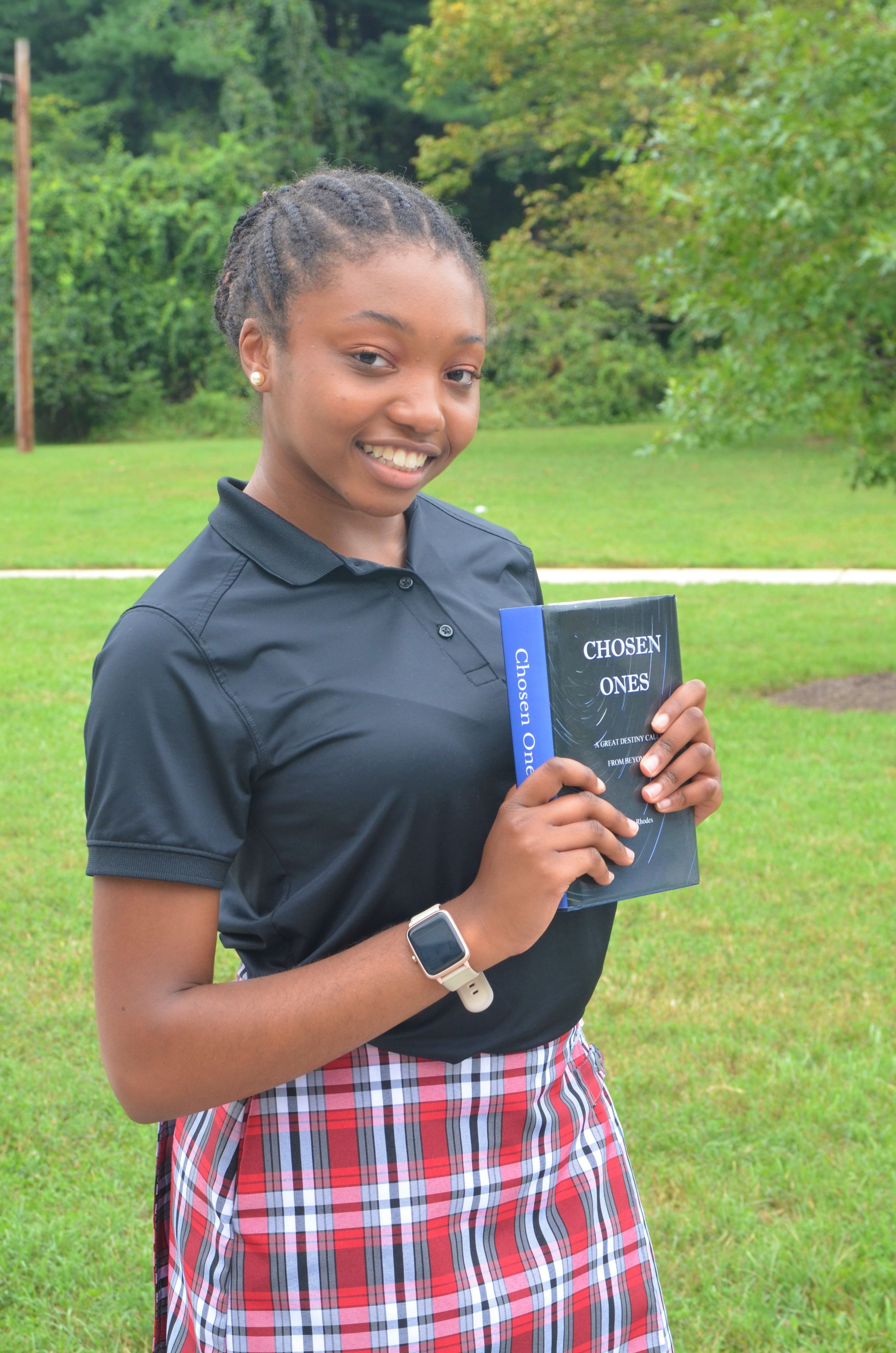
What was the process of writing and publishing Chosen Ones like?
“Publishing a book is not an easy process. After you finish writing something, in order to protect it from infringement, you have to get it copyrighted with the US copyright office so you can have all of your intellectual property protected. After that I started looking for an editor to edit it because I wanted to make sure it was completely fine before I started to put it out there. My editor is actually a former graduate of Rockbridge [Catherine Roshner], and she herself is an author with a major in English, so she knew what she was doing. My violin teacher knew her and recommended her to me and me to her, and so she took my first draft, and she did it in a month; she did content and grammar and style, all of that. She gave me her comments and I went from there. When I went to turn in my second draft to her though, she was unable to do it due to her own job, and so I decided that I would have to self edit. So I ended up doing an extra twenty-four drafts, all self edited, so it took a total of twenty-six drafts and it was only then that I was like, ‘okay, I think I can publish this.’”
How has your time at Rockbridge influenced your ability to write a novel?
“I always thought that I was an okay writer, and then I got to dialectic and Mr. Head’s writing class. Structured writing has not always been my thing, because with fantasy you can pretty much do whatever you want and no one will care, but with structured writing there are guidelines you must stick to. But it has been helpful because learning the right structure, even though it’s not always necessary in the realm of fantasy fiction, is still a very good skill to have and it is a skill I did not have. Literature classes and writing at Rockbridge has improved my strengths in research and in grammar and style.”
Is there a message or moral in Chosen Ones that you want your readers to take away?
“There are several messages and morals that I tried to bring out in Chosen Ones. One of the biggest is the theme of redemption. The idea that even those who have gone wrong can be turned back to the good side.”
How has your time at Rockbridge influenced the moral of your novel?
“At Rockbridge we read a lot of books that are fictional but have underlying moral themes like A Tale of Two Cities, or Macbeth, or stuff like that. So the moral was influenced by the fact that I started paying more attention to how the authors would hide the underlying moral value of their story underneath the fictional aspect of it. That definitely influenced the moral, especially how to do it in a way that it is clear, but also flowed well with the story.”
What would you tell someone trying to finish a book?
“Commit! You have to commit to finishing a book. Because it’s on the shelf it looks like it was easy, but it wasn’t. You must commit and you must be willing to go through both the hard and the easy in order to make it to the end. I know for me there were a lot of times I wanted to give up, I was like ‘this is too hard, I don’t even know what I am supposed to do.’ But I was like, ‘I’ve come this far and it would be a shame to stop because I quit.’”
Is there anything else about you or Chosen Ones that you would want people to know?
“Chosen Ones probably would not have gotten finished if it hadn’t been for my back surgery which I had the summer of 2019. It was a major surgery, I was on bed rest for six weeks. Because of all that downtime I had, I was able to get a huge chunk of it done. I had not been able to find time to do it before, so because of that I was able to do a lot of writing. I feel like if I hadn’t then it would probably still be in process today. So that was a huge blessing, and I am very glad for that time I had to finish it.”
Leading by Example: The Class of 2020's Impact on Rockbridge Academy
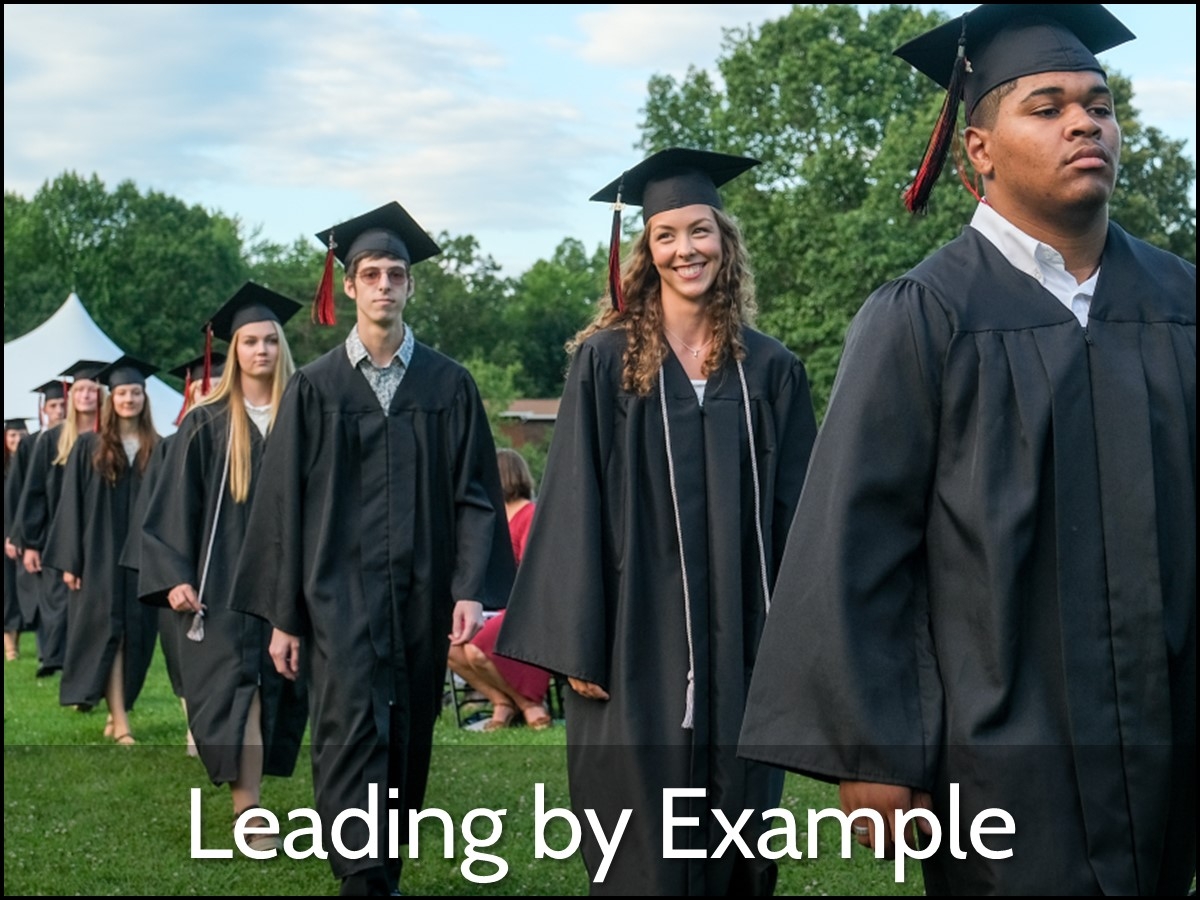
I was sitting outside in mid-July watching the first ever outdoor Rockbridge Academy graduation when it hit me. The young men and women in caps and gowns, that I had grown so accustomed to having around, weren’t seniors anymore. They were graduates—off to start a new chapter in their life, likely far away from Rockbridge. As the school year approaches, the idea that the class of 2020 won’t be there is becoming all too real. And, as a rising junior, watching this class graduate made me realize how I want to graduate: having made an impact, a difference in the lives of those I will leave behind. It was a privilege to watch this class graduate because they have done just that. This fall, the class of 2020 will be gone, off to do God’s will elsewhere, but through their exemplary leadership, they left behind lessons in love, joy, and faith that won’t be forgotten.
This class taught me much about how to love one another in a Christ-like manner. Their constant encouragement and support of one another is a great example of how to be a good friend. When my brother, Zach, tore his ACL, I watched his classmates come together and support him by praying for him, visiting him after surgery, and encouraging him through a difficult time in his life.
Not only was this class a tight knit bunch who cared strongly for one another, they poured out this love on younger students. As a new student at Rockbridge this year, I barely knew anyone, but on the first day of school multiple seniors went out of their way to get to know me. I stepped out of my car and was immediately welcomed by Lauren Bailey who later took the time to follow up with me at lunch. There was not a day that went by in which I didn't see a senior assisting someone else. Whether that was giving rides between campuses or to events, sharing helpful advice, or just being someone to laugh with, they were there and eager to serve. Their leadership in events such as FCA, sports, and clubs will surely be missed; but they have left me with a deeper understanding of how to love one another in Christ.
Radiant, abundant joy exuded from the class of 2020. On any given day you could hear laughter pouring into the halls from either twelfth grade homeroom. They kept laughing through quarantine in their late night zoom calls where they shared jokes and showed off their pets. These graduates brought their joy wherever they went, but that isn’t to say they were never serious; I have watched them tackle difficult tasks with persistence, carry each other's burdens, and deal with important matters discerningly. At the 2020 March for Life, Rockbridge’s group got separated into multiple small groups, many of which didn’t have adults in them. I witnessed the seniors take charge, letting people borrow their phones, offering to wait for parents with younger students, and leading everyone in making a human chain in order to get to the metro station across the march without losing anyone. I am continually inspired by this class’s ability to be hardworking and dedicated while still being able to laugh and have fun. This kind of joy is infectious and their laughter and smiles brightened Rockbridge. This class has shown me how to find the joy in every circumstance and share it with those around me.
Each graduate’s faith was highlighted through their demonstration of love for others and uncircumstantial joy. During quarantine, this class kept our FCA bible studies alive by way of Friday morning zoom calls. Ryan McDowell, Alex Lawing, and Jillian Schwartz led us through Phillipians and 2 Timothy where they explained God’s word and applied it to our lives while many other seniors offered valuable insights. This class has always been ready and willing to share their own stories in order to help or inspire others. My faith has been strengthened in indescribable ways from my time at Rockbridge, and these graduates have played a huge part in that. I am sad that their continual example won’t be around anymore, but I couldn’t be more grateful for the ways in which their faith has ministered to me.
This class has made a tremendous impact on myself and many other students. As a rising junior, my class will soon be in a position where we too can make an impact on the other students. Being an example is a responsibility that should not be taken lightly, and I am so thankful for the example of the recently graduated class. They taught me to never be too busy to help someone out, to take the time to enjoy the wonderful gifts God has given me, and to trust in the Lord for my future. I want to graduate having taught these lessons to the classes that come after me. This class will be missed deeply. However, after seeing and cherishing the effect they had on Rockbridge, I know they will continue doing great things for the Lord wherever they go. So, while Rockbridge won’t feel quite the same without them, their influence in how to love like Christ, be persistently joyful, and have a faith that can move mountains, will live long after they leave.
Olivia Reardon, ‘22, loves to write and can usually be found reading a good book. She is part of a dance company and enjoys spending time with friends and eating ice cream.
Blessed Is the One...
Blessed are those who dwell in your house, ever singing your praise! Blessed are those whose strength is in you, in whose hearts are highways. As they pass through the valley of Baca, they make it a place of springs; also the early rain covers it with pools. They go from strength to strength; each one appears before God in Zion. (Psalm 84:4-7)
Last week we saw that one who is blessed by God takes care about where he walks. He carefully chooses his path so that he doesn't find himself taking advice from those who despise God, eventually listening to that advice as a habit, and finally joining them in the seat of scoffers. In Psalm 84, we see the opposite perspective: those blessed by God (ashrey) desire to dwell in God's house. It's interesting that the word "dwell" here is the same Hebrew word as "sit" in Psalm 1. The psalmists are giving us a clear choice: dwell in the seat of scoffers, or dwell in God's house, ever singing His praise.
We aren't called merely to sit there, though. We are to give thought to how we get there. That is what verses 5-7 tell us. First, we are to find our strength in God. Only in Him can we make it through this valley of tears that the world so often is.
Second, because our hearts long to be with God, they should pull us in that directon. The psalm tells us that in our hearts are highways (literally, a road for pilgrimages). Most English translations capture this by adding "to Zion." If we are blessed by God, the highways in our hearts lead us, as if by pilgrimage, directly to Him.
Of course, that is not the whole story. The final verses of this passage tell of our impact on those around us as we travel the pilgrimage road. As we pass through the Valley of Baca (literally, the Valley of Tears), it becomes a place of abundant life: instead of a desert, it is full of springs and the blessing of rain. Not only does God's blessing transform us, it allows us to be agents of transformation for those around us who might be suffering!
We can go from strength to strength, not because we are strong, but because our strength is in our God who sustains us. Finally, when our road is done, we will appear before God.
Living in Psalm 84 Today
How can we live in light of this psalm today? First, by remembering that we don't have the strength to do anything of significance on our own. Most importantly, that applies to relationships. Comparing the thoughts from Psalm 1 with those of Psam 84, we can either be those who distract others from the road to God (by giving ungodly advice, encouraging sinful thoughts and actions, or just scoffing at righteousness), or we can be those who bless others.
When we bless others, we are taking up the role of the ashrey, those who have already been blessed by God. When we encourage others who are suffering, living in the Valley of Tears, we are taking up our calling to be a blessing to others, to serve them before worrying about ourselves. We don't do it because it somehow benefits us; we do it because of our love for them and for God.
What might our school be like if each of us saw our relational roles in this way? We could care for others, not being troubled that we are weary travelers, but instead stopping to bring a moment of abundant life to someone who is more than weary, who is weeping. That is worth being passionate about.
